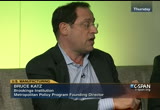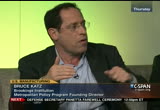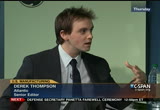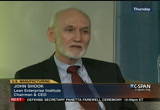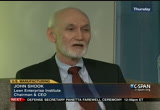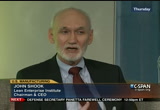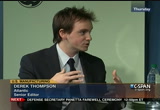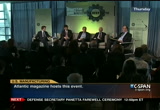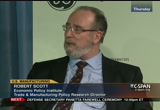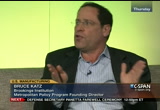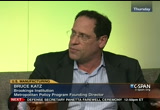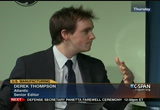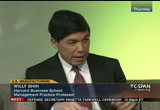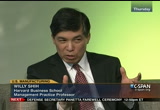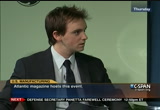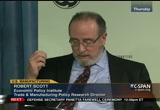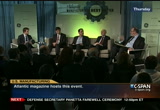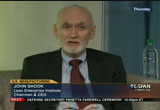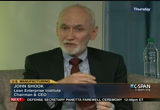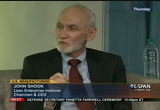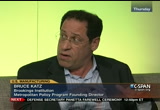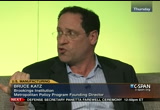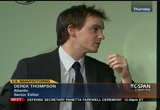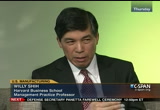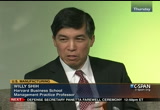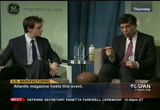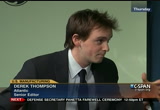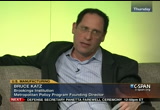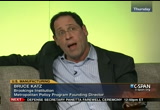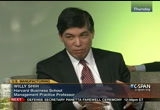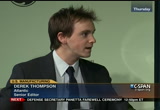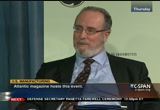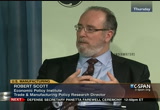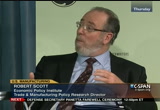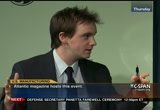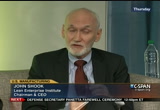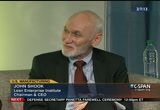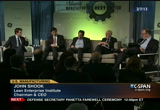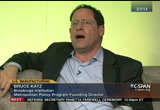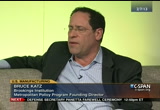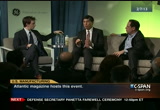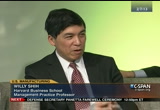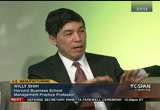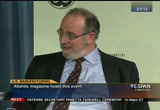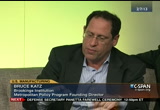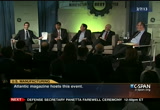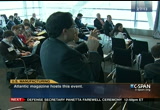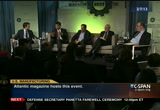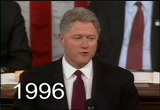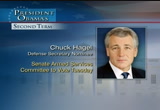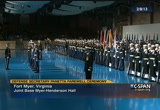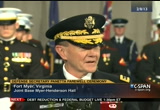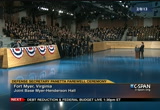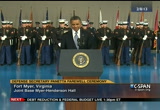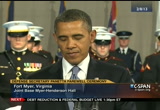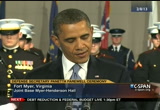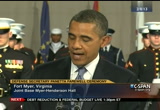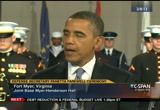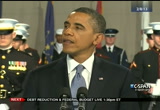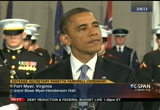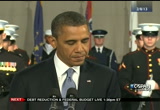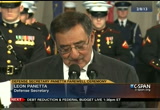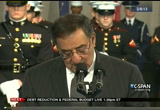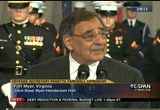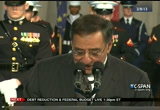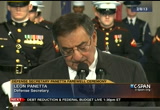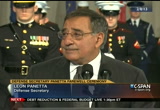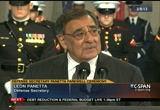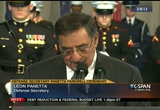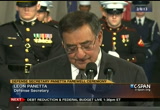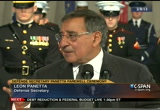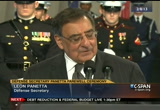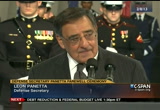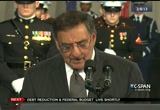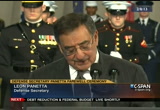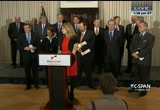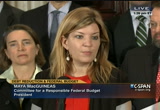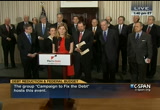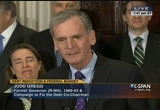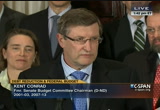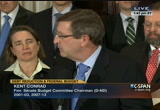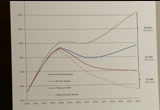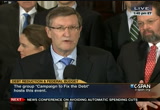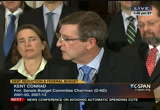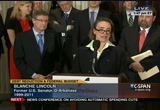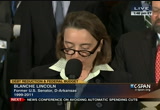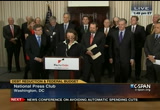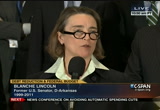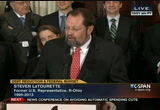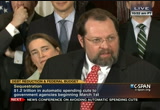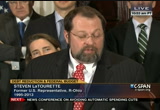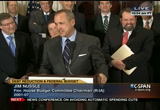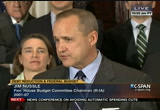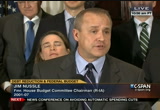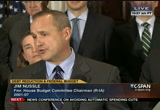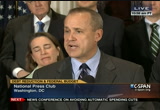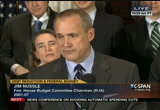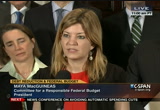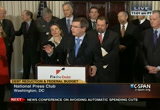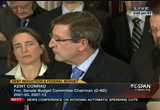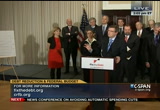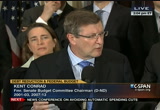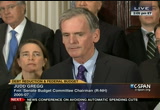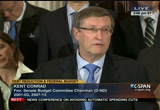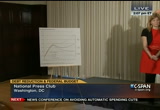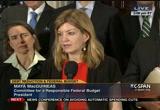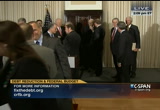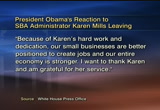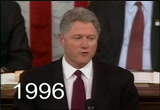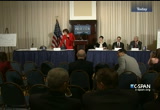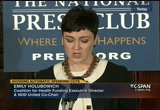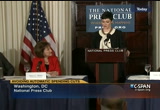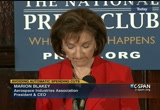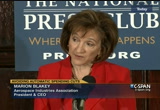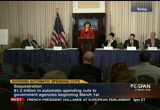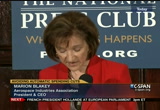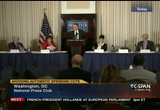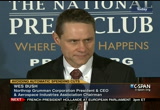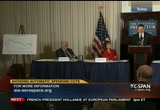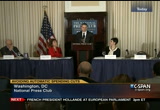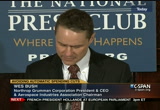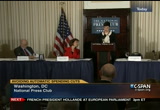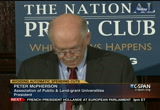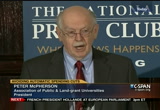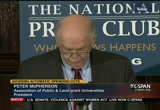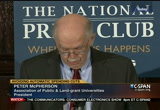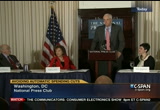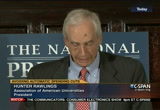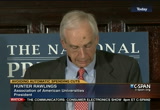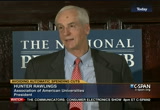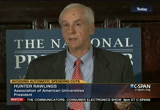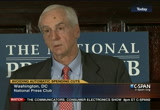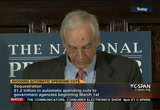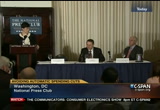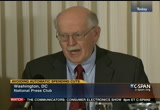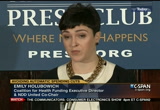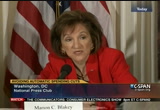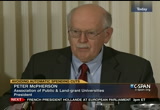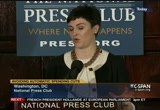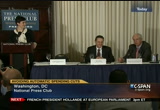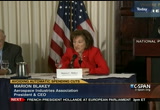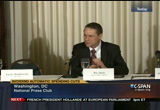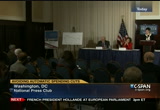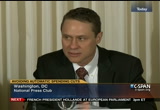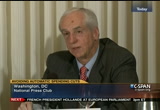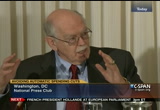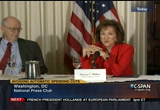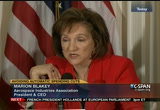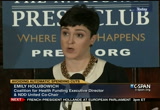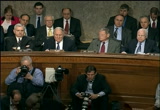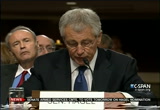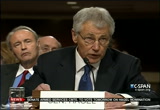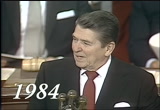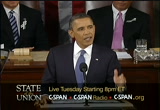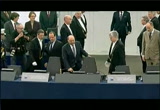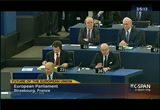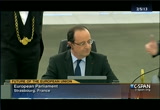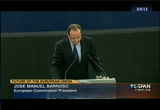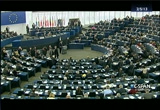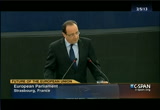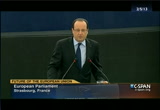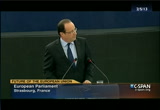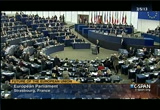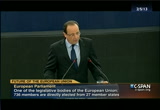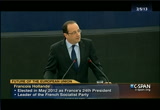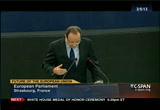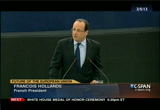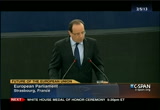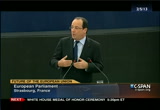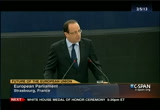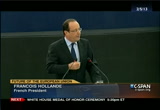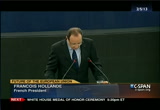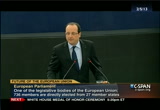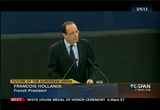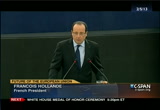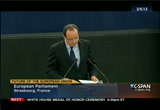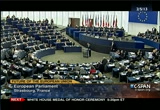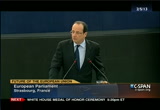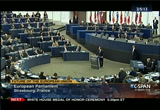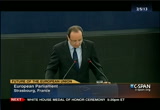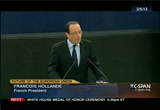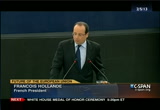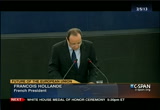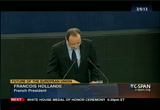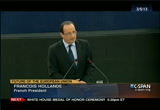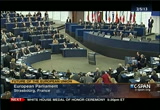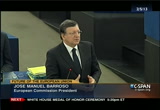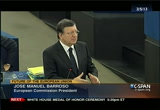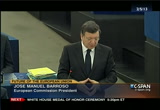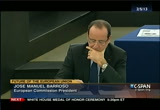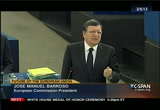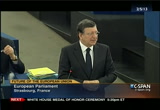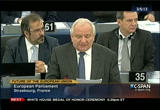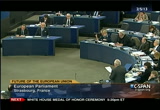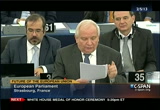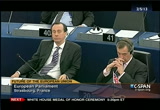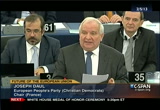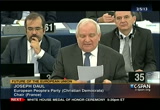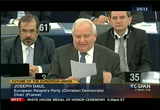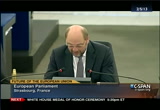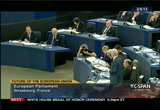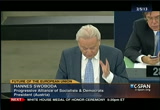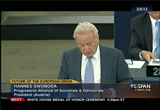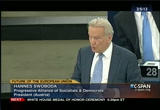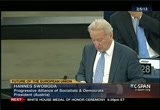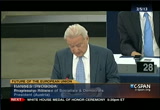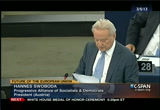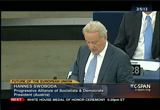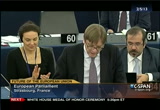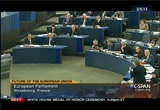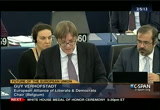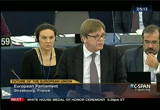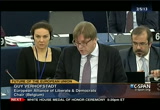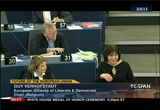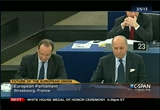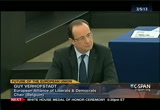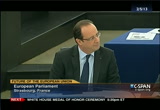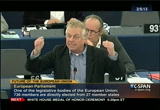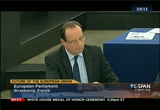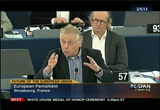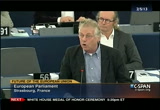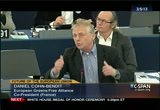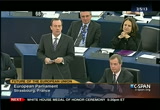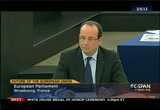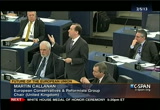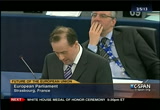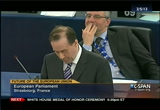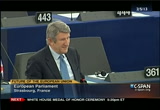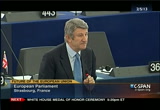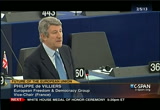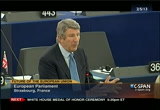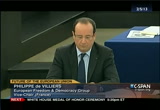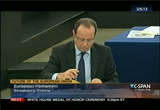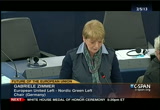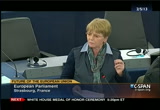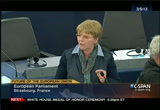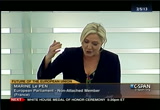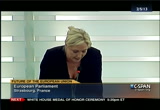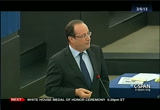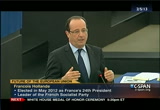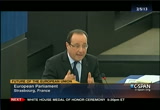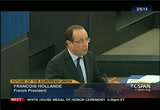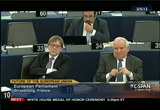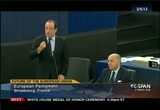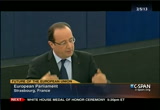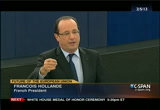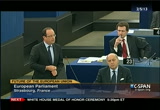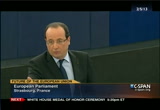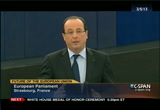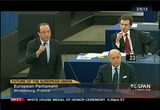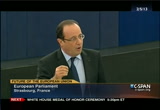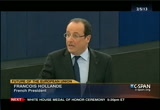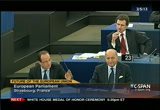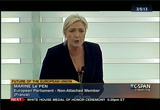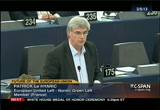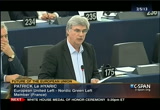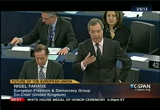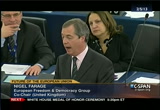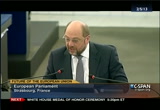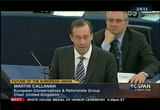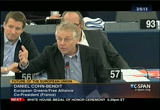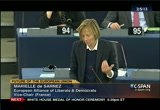tv Public Affairs CSPAN February 11, 2013 12:00pm-5:00pm EST
12:00 pm
even going back into the high schools. automotive, these michigan, south east tennessee on to the south. aerospace will see seattle, hartford, which it tar. -- of wichita. it is the same with by medical, etc. if every city and mitropoulos got hit hard on home building and retail and began to look up there traded sectors and began to look at the advance manufacturing sectors and basically would say, what do they need to survive and prosper? and do we have a skills problem? do we have an infrastructure problem? do we have an innovation break down, essentially between research and development, a prototype, development?
12:01 pm
this will basically follow the health of the cluster and particularly with small and medium-sized firms, what are they doing to essentially help lee is relatively small firms? -- help these small firms.?? >> john, said a funny thing. you said no matter how much the government screws up, caltech will still be caltech and m.i.t. will still be m.i.t. outside the beltway, it is a different reality and you talked about public and private partnerships at the local level. can you talk about why they are so important and maybe share your story about how you see the power partnerships?
12:02 pm
>> i did not mind it versus the real world. i spend most of my time with the company's seen what kind of problems they're having in what they're struggling with. it's true. in the same way that jeff immelt was not worried about only g e come up but there are a lot of companies out there that you do have to worry about. i'm not worried we're going to get left behind in terms of did creating all of these. we have the smartest people in the world at caltech's and m.i.t.'s. we need to work together to bring that to bear so businesses are doing well and we have jobs. that has been my concern for a long time and it continues to be so. this morning, there is a lot of discussion of partnerships.
12:03 pm
then we heard about network subcommunity level. then i will talk about teams and the importance of that in being successful. i think this is still very true and it is something we are not necessarily always good at. we have to find ways to combine this with social technology so we have social technical systems up the large corporate level, national community level, and on the very front lines of value creation. i first got involved in this. about national oil policy 30 some odd years ago and i spent some time working for toyota before they brought the system to the united states. i worked in toyota city to help transfer systems to the united states. i have done that over the years. as we went through a process of
12:04 pm
determining what skills are necessary and it won wonderful consensus is the fact that we need a good education. community colleges are still very important. the one pressure we have as we started working with uaw, general motors, to find the right kind of employees to work in a system was team-based problem solving and this goes back 30 years ago. this is not new. i do not think the equation has changed now that we're bringing a lot of manufacturing back. i think it is a matter of how we have come to understand the cost of living things overseas without understanding the implication. -- the cost of moving things. this will be the key to how well we can be successful. >> immelt also talked about power obtained. there are two other things that he said that i want to push to
12:05 pm
you now that you are his lawyer. when he said that the future of manufacturing looked great and there'd be not only nominal growth but also that manufacturing growth had a chance of increasing as a share of the total climate, he also said he was extremely bullish 3d technology. when a look at the side by side, i see there is going to be a lot more manufacturing work and bring more labor in to the united states, but at the same time, there is this new cutting edge of the horizon technology that is a labor and timesaving and does replace hours worked and jobs. what we were thinking about is impossible and a tradeoff between manufacturing productivity growth and manufacturing employment. what are some good ways to think about how to solve this?
12:06 pm
>> the key is to said that there is a chance. there are a lot of "if" in that. we have productivity growth argent 4% per year and when it manufacturing was roughly stable. we lost 2% of total jobs in that decade. in the last decade we lost 5.7 million manufacturing jobs and we also had a 4% productivity growth, actually a little bit slower. what's different? we have seen an enormous increase in the u.s. trade deficit, especially with countries like china. today, they happened to release a report that looked at the effect of currency manipulation, perhaps the single most important factor and explain the growth of our trade deficit. eliminating the trade deficit or eliminating currency manipulation could reduce the
12:07 pm
trade as a by roughly $190-$490 billion. doing this would increase manufacturing employment by up to 1 million jobs. that's a big downpayments in the whole we have created in manufacturing and employment. one thing we need to do is create demand. that is what we did do but we did not do that in the last decade. we need to shift the demand to domestic produced goods resulting in the hiring of domestic workers. manufacturing jobs are amongst the best for workers especially for those without a college degree. high wages, good benefits. >> bruce, you worked in washington, d.c., and brookings is right off dupont.
12:08 pm
>> i am mostly on a plane. >> industrial policy is a dirty word. if you go to any other domestic place, it will land you in a city that practice is something that looks a lot like industrial policy, picking winners and losers, giving tax credits to a specific companies and trying to build clusters. they're giving us an advanced manufacturing systems. >> first, a shot at the capitol. we do have industrial policy. it is called the real estate sector, mortgage interest deduction. we have decided the big winners. that partially describes why we have had the consumption we house. we get to the local level, what is your choice?
12:09 pm
how quickly do we built with public money next convention some are coming the next performing arts stadium? do we try to throw money to bring a firm literally across the border in many cases? or another alternative, can we strengthen our strength in the traded sectors? it may be 20%-35% that drives everything else and that is what has begun post-recession. we are beginning to see a bit of reshoring with shale gas. mayors, but more importantly business leaders, firms, universities, and the skills intermediaries together, the network, are saying -- what do we have here? what do they need? the biggest response they get for most of these firms is that
12:10 pm
they're facing a industrial worker retirement to some extent than they have no feeder system in the locality or mitropoulos because they got rid of them. what we're basically working on across the country is called the race to the shop where we can bring back a 21st century kind of technical training customized to these very differentiated specialized clusters. >> about five minutes ago, i said there was a tension between productivity growth, competitiveness, and job creation here in the united states. as i was saying that, i wanted to correct myself or throw in a caveat. your time at kodak, you spent seven and a half years at eastman kodak. that suggests that maybe there is not such a clear trade-offs. maybe it is possible to have competitiveness and raising job creation and learn from some of these companies that have
12:11 pm
outsourced to quickly and lost competitiveness. can you tell us about the kodak story? >> i spent 28 years in the industry. when you're in the industry, you have all these problems every day. every day there is a crisis, especially when i was at kodak. you do not have time to sort out the problems or have been working through that list of problems at harvard business school. they said i have always been an academic but i just did a 28- year field experiment i'm just slow at interpreting the data. i walked into kodak and they said, we want to build digital cameras in the united states and we know the labor cost differential is really high so here is this automated factory we built. it is magnificent except all the components have to come from japan. in those days in the 1990's,
12:12 pm
there were still the tacit knowledge that jummy did. in reviewing the problem, back in the 1960's photography was all about film. none of the profit was in the cameras. someone probably not trained at harvard and said, if you get rid of camera out manufacturing, but profits will go up. it sure did. the same time the consumer electronics industry shifted all of the television assembly offshore. everybody made more money doing that, right? the problem was then the technology change. all of a sudden, everything that are not important, electronic sensors, motors, viewfinders, lenses. there was no longer any capability to make them in new york anymore. this is where it came up with the notion of the health of the
12:13 pm
industrial commons which is really important to being able to sustain your ability to innovate. the company leaders then think about more broadly the capabilities embodied by suppliers, educational institutions to train workers? component manufacturing, toolmakers, all of those things. there is a classic tragedy of the comments problem. >> does the government have a role in helping companies like kodak? not kodak themselves, but are there other laws we can pass to nudge people away from outsourcing not only jobs but also their intellectual capital and their ability to grow in the future? >> absolutely. i have talked about demand-side policies. we need a level playing field to get the exchange rates right. that will cut our trade deficit
12:14 pm
about in half. it is but the problem and an opportunity. we can bring many more jobs back if we make investments in the right kind of supply cycles. i can last four or five of them. we need to invest in technology development. we need to invest in research and development. other countries invest a lot more than we do. we need to invest more in manufacturing extension services to build these networks among regional firms. in a paper i just published, a look at spending in germany and japan and on a comparative basis, they're spending anywhere between 28 and 40 times as much as we are as a share of gdp i exactly those kinds of activities. we need to work on financing. in germany, for example, small and medium-sized firms get their
12:15 pm
financing directly from banks. in this country, those firms do not have access to bank capital, so there really constrained in their access to cash. that is another area where we can contribute. we talk about the idea of creating a fannie mae. we have one for housing, why do not have an institution to get capital to manufacturing institutions? that would be very productive. and a not take a lot of money, but it would be helpful. we already talked about investing in training. the thing we really do not do well at all is planning. if you look at successful countries, japan has had the ministry of industry and trade. china has the handsome as five- year plan. we need to do planning to figure out how to allocate resources. you would think the commerce department might do that.
12:16 pm
they do little of that right now. >> rob laid out a veritable buffet of things we can talk about. john, do you want to comment? what about planning? if not, you mentioned three terms that i thought were near synonyms and want to make sure i understand the difference -- teaming, partnerships, and networks. are there meaningful differences? how can they help us think about competitiveness here at home? >> the same thing at different practical levels. this morning, there was a lot about partnership at the highest level here in washington, a partnership between industry and the government. i think that's an important dimension to have. at the community level, there is not working. it's also critical. then mignonette outside companies actually creating value, whether it is manufacturing or service, it is
12:17 pm
about how we can promote the most effective and efficient creation of values. it turns out the way you do that is teaming, team-based collaboration. one of the nice thing, perhaps the only nice thing, about being older is that you can see the pendulum swing over the decades. and so now, reshoring is a big thing. we're here sponsored by "the atlantic." there was a good article in the december issue about in- sourcing. there has been a trend of moving things back and forth over the decades. now we are reshoring. different things will be made in different places. as jeff immelt says,
12:18 pm
globalization is not a bad thing. things will be made in different places and they should be. we should be spared about what we do and where. that means making holistic decision making of understanding where we are now and thinking long term. there are great examples of companies that have done this all along. one i can think of right now is an office furniture company that has introduced some great things, they are the apple of office furniture. if you go and visit them today coming you will see this incredible team-based problem solving innovation. they were under the same pressures to offshore 10, 15, 20 years ago and their competitors did that. a look the other business and realize that it was worth
12:19 pm
staying. having operations near where they are doing design, near the customers was important for the kind of synergy. they realize that early on and decided they could find ways to make it work and be competitive right here. the key was networking within the company where they combine people and technology. >> bruce. >> i think these are great comments. i want to add to the list infrastructure. for many of these small and medium-sized firms, strategic advice. some of the issues in small and medium-sized firms are about facility remodeling. some is about a succession plan. a lot of these are family owned and they are now in the third generation or so and they really have to think about it. i think what's happening is we are pushing down responsibility
12:20 pm
from a governmental perspective to the states and to the major metro's. they have become an unreliable partner. if sequestration goes through in the next couple of weeks, they are basically going to take a hair cut to everything in non- defense discretionary including our and the. -- research and development. they're not making any choices. they are telling these firms, the clusters, that somehow they're going to have to compensate. in some areas they are and can compensate, particularly with foreign firms coming in. they're demanding the locality organize themselves in such a way that part of the deal is you guys act like we act in europe. it's very interesting.
12:21 pm
i think we're seeing a defacto resorbing responsibility in the public sector. is this if it's the best solution? probably. your attitude is, we get stuff done and we're going to go through this list and figure out some kind of intermediary reinstitution. we will figure this out. very different on a mind set kind of perspective. >> just about every single success for recovery going back the last 30 years has relied on exports to help drive growth. it's very difficult to operate financial crisis for domestic demand to raise. we have seen that every year and quarter since 2008. you have to revise it -- you have to rely on others to fuel you.
12:22 pm
can you talk to is a little bit about your attitude toward domestic manufacturing being export first? in the states, we are not like germany. we are not surrounded by all of these companies requesting goods. we are the biggest consumer in the world. talk a little bit about how to refocus us for an export-driven world with 1 billion new customers. >> it is a really interesting and opportune question. one thing we have been blessed with is the world's largest market. we're still four times larger than china. for many firms, especially the smaller ones, do i work harder to develop my export business when all of the businesses are near at hand? i think it requires a change in mindset. i have actually done a lot of work in denmark recently.
12:23 pm
it's really interesting. you find all of these small countries, a population of 5.6000046% of their gdp is in exports. it is a mentality that is, if i'm going to survive, what do i have to do to do that? we are entering in the world. if you look today, these statistics are a little older, but the mobile handset market in east asia is about 3.5 times larger than north america. china is the world's largest market for automobiles. vw and bmw sells twice as much there than they do in germany. one of the things in the new world order here is as you have all of these new consumers
12:24 pm
coming on, we have to think about this and mr. immelt talked about this notion of a larger market as well. the u.s. historically, especially if you look in the post-world war ii era, we had this wonderful period when we dominated mass manufacturing. scions had won the war. we made these huge investment because of the cold war that led to space technology and so on. it was a unique time. now the times have really changed because not just china, but india and brazil, some of the other markets, they are going to be or they will be growing too large markets. it makes it a particular challenge for ceo's in terms of what my global footprint needs to be in terms of tapping into all those clusters, recognizing
12:25 pm
market opportunity, and also leverage skills. it's really a different world. >> a lot of people think about manufacturing products. one thing that comes to mind, i think, just because so many people have it is a smartphone like the iphone and a tablet. it occurs to me we cannot just keep buying screens. there is a limit to the number of screens a family can possibly own. we have run completely out of ideas. this is sort of an annoying and journalist question. if i had to write a piece, theoretically, about the next manufactured product that american families are going to get hyper about, one sector that it occurs to me may be fruitful, may be the medical device industry, some sort of medical device that everyone can use in
12:26 pm
their home so then you would have to have a manufacturing and transportation network to make this new thing and bring it to the houses. should they go back to my office after this panel and write that? if you disagree, what may be the next new thing? >> go to microsoft's campus and look at their smartphone. they are already beginning to play with those technologies. what did the inevitable demographic we have in this country? aging. the baby boomers will demand products. in those in metropolitan areas that tend to cluster around the mayo clinic, cleveland clinic, washington univ., this is where you're going to find that commercializing to prototyping
12:27 pm
and then the question becomes, are talking about mass production here or some kind of integrated supply chain? athink we're going to see burst of innovation in that field. it is an interplay between what house and will look like, what the automobile sector will look like, what personal devices people will be carrying around. i think this is the kind of planning, frankly, that is going on in these clusters and these networks, city and metropolitan. they're trying to figure out what we can make now off of our base. what can we make tomorrow? it is probably in collaboration with trading partners because there is already a network of trading city's emerging because of these supply chains.
12:28 pm
they are not only thinking about it themselves but they're thinking about the necessary link with some of the global markets. >> i'm going to give what sounds like an incredibly pessimistic but it is actually optimistic answer. i was in the factory in southern china that makes 50% of the blood glucose meters in the world and i took a class in india that makes all this acetaminophen that we thought were made in new jersey. yes what? it's not made here. -- guess what? of the supply chain and capabilities for the commercialization and industrialization -- are the capabilities here? a lot of them are not. the optimistic side of this is i think we're also moving to a world where we're going to place
12:29 pm
a premium on systems. the reason the iphone as good as because there is a software and a set of complements manifested by the app store for that system. a lot of what has been offshore has been components. those guys are very good at components and lousy at systems. that is where my hope is. it was mentioned earlier today, the cyber physical assistance, that is what we need. software plus hardware is the opportunity for us. >> i don't know if you want to jump in on this. i was talking to an editor at "the atlantic" about another big idea and, a business story that maybe we could buy into at the time that it was coming into the public consciousness. one thing we're talking about is the possibility that industry after industry keeps getting
12:30 pm
bitten by the productivity bug. we see a familiar thing. unemployment goes up and then comes crashing back down. -- 40% of thes wer population are farmers in 1990. we're seeing the same thing happening in retail where total retail employment has been stagnant since the 1990's, partially because of wal-mart and amazon. is there a risk? what is the risk that we are running out of work? can you tie this into the future manufacturing? that would be helpful. [laughter] >> that is certainly a left field question. i do not think we will run out of work. one thing we have seen in this country is that there has been a tremendous increase in the number of hours worked by the average family.
12:31 pm
americans standout for that. we are now working something to 2200 hours per year in the united states. we take advantage of the workment of women in the an force. in western europe, they are for more leisure so the average family work week is going down to 16 or 1700 hours per year. that is substantially less, much longer vacations, much more leisure. one of the great benefits of productivity growth is that it can lead to the availability of more leisure time. we need to be able to generate sustainable and comes for those families. they have to make more than minimum wage. the problem with the model we are currently developing is that it has been generating a lot of low-wage jobs and that is where we seem to be heading. it's important to change course.
12:32 pm
and for continue down this course, we're going to see manufacturing continue to shrink and the supply of good jobs with good wages for the 70% of americans who do not have a college degree will probably continue to go down. if we can rebuild manufacturing or at least stabilize manufacturing employment, then the supply of good jobs can go up and we can spread a little wider so people will not have to work as much. to go back to your earlier question about exports leading the way out of the recession, this was the point i wanted to get to, we have had strong export growth. we have also had strong import growth. the trade deficit has been growing especially in manufactured goods and that is where most of the jobs are. the trade numbers are going to come out tomorrow for 2012. they will show the trade deficit is roughly stable for last year, but if you look in the details
12:33 pm
the money was -- in the details, what you're going to find is the net import of manufactured products are going to go up. that means we're great to have a net loss in manufacturing jobs. rising imports, displaced jobs, and if we are unbalanced, the trade balance get its worse and it means we're losing jobs related to trade. that has been the problem over this recovery. that is a problem have to address again. back to my first point, leveling the playing field. getting rid of things like currency manipulation and other types of on fair trade. >> thank you for answering my complicated question. can you talk about how the makeup of manufacturing jobs have changed? in the same way that i wanted to make a role in the second question that we would not talk about manufacturing so it was just one thing that people were doing but rather a category to
12:34 pm
describe many different things and many different kinds of workers making different products. has the technology revolution and the fourth globalization change what sort of things we now consider to be a manufacturing job? >> i think it looks a little different. i spend most of my time out in the factories on plant floors. it looks remarkably like it used to. even the phenomenon of offshore income of one thing that happened is they send operations overseas, then they lost certain capabilities. you could not in a bitter round. they tried to bring it back and -- guess what? they struggled with it and try to bring manufacturing back. as it turns out, as they bring it back, it is not as it was before because the train has moved. you need different skills than you had when you send it away.
12:35 pm
even the term "reshoring," , it is the wrong term. we want to have "right shoring." as we bring it back, and needs to be in much better process than it used to be and it changes the work of each person involved in the system. the main thing we want people to have our critical thinking skills, problem solving, and innovation. the other things they can provide. we've been talking about education and community college, but we have not talked about the managers. they come out of our business schools. we're very proud to have the best schools in the world, but honestly speaking, i'm glad willie is at harvard business school, but bringing 20 years of real-world experience there, what is happening is they're dominated by a finance departments, financial analysis,
12:36 pm
and strategic looking. it put manufacturing in a box on the floor. it is all commodities to buy where your cheapest. now managers are learning the best way to approach it and i think a lot of that began in our business schools. we invented business schools. they can be wonderful thing, but we need to make sure that it is not only the critical problem solving skills but making sure our managers have them as well. this is what will lead to, i think, a different kind of world moving forward. i did not know with the macro number of jobs will be. i do not look at that kind of thing, but as a percentage of, productivity will may be reduced that number, but the percentage of companies that will be based here and be based where the markets are, i fink, will increase. that again changes what it looks like on the factory floor and it
12:37 pm
changes what those jobs look like. >> i want to finish with both of you. >> can we pitch stories? >> feel free. you have my e-mail. can we talk about the community and community college response to this and how colleges and some cities are responding to a perceived deficit of workers for the skills that we need to be competitive and the manufacturing rights for those cities? i want to give you to talk about how schools like harvard business school have changed the conception of what it means to be in manufacturing. >> there are a lot of success stories. you may not have everything in one particular place, but it is right to think about it as an ecosystem. in the perfect, ideal place, your four-year college will have an advanced r&d unit initiated
12:38 pm
towards your cluster. the community college, and this is strong in places like ohio and michigan, they will have a curriculum that the manufacturers tend to write and oversee organized around their skills needs. the most interesting thing we're beginning to see is a push back into the high schools. you're beginning to see manufacturing high schools, some charter, some public. there is one in the austin neighborhood of chicago which still has a pretty decent manufacturing base. kids are coming in from that neighborhood, a caustic inner- city neighborhood with fourth and fifth grade reading and math skills. by the end of the four-year igh schookl, they have credentials. it cuts across the secondary, post-secondary skills units.
12:39 pm
some companies have their own training. it tends to be part of a broader ecosystem which goes along with a particular cluster. then the question is, who pays for it? the president had a proposal last year, and $8 billion investment in community colleges and another $1 billion in advanced industry innovation. my sense is this will get paid for more and more at the local or state level. short going to tell you a story which i think has a lot of bearing. one of the things i do is i place as many students into manufacturing more production type positions as i can. two weeks ago, one student i placed came back to me. it was wonderful. she was so happy, having such a great time working with the real stuff, producing products. she says the hardest thing is
12:40 pm
when she first went in explaining to people repeatedly why would someone with an mba go there? it is a broader problem about thinking of the industry as dirty work. makings of the most gratifying jobs you can have, okay? one course some offering this semester because the administration has been suggesting to me that we need people to help more in the management of these technology and finance-based businesses. the admissions office had been looking for more engineers and scientists coming in for me to work with. i said, that's great. i find out all the guys were actually trying to change careers away from engineering and science. that's a broader problem in our country.
12:41 pm
i completely changed course. i wanted to target all the guys going to finance and private equity. that's what i wrote into the course description. venture-capital come to private equity, here is in need to know about science and technology to take this course. it is a real-time experiment. i think what that reflects is that we need to work on the attitudes in this country. who are our heroes? i grew up out that sputnik moment and i benefited enormously because of a sudden, i wanted to go into the space program. it motivated a whole generation of scientists and engineers and we are still reaping the benefit of that generation, but they are now retiring. that is more the question i would put out there. it's a critical issue for this country.
12:42 pm
i sat in conference rooms. what did you study? metallurgy? engineering? >> i could not find a city with that. >> it is about remaking the manufacturing sector again. >> it is also about manufacturing big again. the number of manufacturers shrank over the last decade. but we lost a lot of bodies in manufacturing. >> any of you, i am looking to place as many students as possible. "you have to write the description and emphasize certain things but you're giving them an opportunity to go out and make things.
12:43 pm
when young people are given that opportunity, they love it. there's a tremendous explosion in small startups all around the country. you see this in different communities where creativity is happening. your ideas not a bad one at all. >> one of the interesting technological fact is this eharmony for engineers going on. [laughter] if you go in detroit, there is a firm that have basically written this program where if you are an engineering student at michigan or michigan state and you wanted a summer internship, he basically go online and then put what you want. if you are a small or medium- sized firm in michigan, you do the same and the computer matches you. 65% of people who get an
12:44 pm
internship in a particular state stay there. this is about the lowest cost workforce development project you've ever seen. you can do all of this. frankly, most of these companies are hidden in plain sight. they are small. no one knows where to find them. there is another company based on a brooklyn that take to designers on one hand of clothes and apparel and they connect them online to factories in the united states and facilities, mostly small, that basically make that kind of apparel. it is an interesting technology moment here where we are now in the second or third generation of evolution. instead of dating, we can have people find decent jobs. >> i really want to keep talking about eharmony for engineers, but we're going to go to questions now.
12:45 pm
let's start over here. >> my name is tom. earlier today, we talked about jack welch and his theory about being in a barge and the factory going all over. what we have devolving is that factories are going local. we also heard jeff immelt say he is a net exporter in china. is it possible that ge may become a net importer? basically sell in china, build in china, and just build in different locations and that is the new factory which kind of says a few things. that is kind of going to the wayside in supply chain. it is that something that is just shrinking at this point?
12:46 pm
has it been eliminated? the final comment is there is a service out of harvard that is kind of creating this atmosphere where you can take any of these clauses that are filled with hundreds of thousands of students all on line and it's raising the playing field. at some point, we're going house and really smart people in africa and elsewhere and they just will not need us. that drive your point about exports. >> do you guys want to answer? twitter length. our next segment is about to come up. >> i would argue that it is all about trade ability. you back to really market size, the cost of shipping something back-and-forth. what we're seeing is a
12:47 pm
rebalancing of trade ability. >> there's no question it's going to a more regional model. supply chains will be compressed. we saw so many things happen after the tsunami in japan. no one knew that there was one factory they're needed in product all over the world. they know the supplier but not the supplier's supplier. to understand that that -- to understand, they have to go in. >> thank you all very much. i appreciate it. [captioning performed by national captioning institute] [captions copyright national cable satellite corp. 2013] >> in for the mets, a press conference with a bipartisan group of former members of congress urging action on the national debt. it is hoped -- hosted by the campaign to fix the debt live at 1:30 p.m. eastern here on c- span. >> given the breadth of products that we have, smartphones,
12:48 pm
tablets, computers, appliances. one area we are investing in is because we already see many consumers multitasking but you're also are in your phone come on the internet, on or tablet, something like that. how do we link those devices together? had a feeling for them to the cloud door to the internet? one example is the galaxy camera that we launched last year. it is a chairman now built in with 3g and 4g capability. meaghan take botas and instantly up load them to raise social media service. bringing wireless connectivity to a camera. linking products like that, to the internet and to each other, that is a big opportunity for us. we think it has a value for the consumer. what the future of technology
12:49 pm
with samsung from this year's ces of international consumer electronics show tonight on 8:00 p.m. eastern on c-span2. >> having observed a steady improvements in the opportunity and well-being of our citizens, i can report to you that the state of this old and useful union is good. >> once again, in keeping with time-honored tradition, i have come to report to you on the state of the union and i am pleased to report that america is much improved. there's good reason to believe the improvement will continue for the days ahead. >> my duty tonight is to report on the state of the union. not the state of our government, but of our american community. and it is up for their responsibilities, in the words of our founders, to form a more perfect union. the state of the union is strong.
12:50 pm
>> as we gather tonight, our nation is at war, our economy is in recession, and the civilized world faces unprecedented dangers. yet, the state of our union has never been stronger. >> it is because of our people that our future is hopeful and our journey goes forward. the state of our union is strong. >> tuesday, president obama delivering this year's address live on c-span with the preview program starting at 8:00 p.m. eastern and the president at 9:00 followed by the gop response and your reaction. tuesday night on c-span, c-span radio, and c-span.org. >> the chairman of the senate armed services committee has scheduled a vote on chuck kindle's nomination to be defense secretary. senator carl levin says he tends to look after committee discussion.
12:51 pm
senator lindsay grahm said he would hold up the nomination until they get more information from the obama administration about the benghazi consulate attack. the defense department held a farewell ceremony for outgoing defense secretary leon panetta on friday in fort myer, va.. he will remain in office until the senate confirms his successor. ♪
12:55 pm
12:58 pm
>> ceremonial at ease. >> ladies and gentlemen, general dempsey. [applause] >> mr. president, secretary and mrs. panetta, ambassadors, members of congress, men and women of the armed forces of the united states, especially our wounded warriors, and we cannot forget bravo. i was hoping bravo would be out there for the inspection of troops, but apparently jeremy thought differently. it is an honor to be here for this event. we're here to show our profound respect and thanks to secretary panetta. i recall play "the tempest," which is a nice metaphor, and i
12:59 pm
like to think of you as the prospero of public service. the secretary has used his arts to imbue a sense of public service in generations of the men and women. and like that knowledgeable duke, he now asks us to let our indulgences set him free. secretary panetta could not have served so well at the fatefully without the untiring support of his wife, sylvia, and his family. and so we thank you for your selfless service that have made your husband's contributions possible. [applause] it is clear secretary panetta has mastered the balance of service and self. last week a clip of you was played on nbc's "meet the press" of you from 1989, and you
1:00 pm
have barely changed. i am sure your mediterranean diet has helped, olive oil for your skin, garlic for your heart, and red wine for everything else. you speak often of your italian heritage, and it is no secret you mother wanted you to be a concert pianist. so is fitting on this day in history in 1908 sergei rachmaninoff premiered his symphony number two in st. petersburg, russia. rachmaninoff was a technical pianist. history records he rarely missed a note despite the enormous complexity of his compositions. but you chose to use your hands to orchestrate other kinds of efforts. you worked both ends of pennsylvania avenue.
1:01 pm
you and sylvia advocated for the purity of public service. then the nation called again and you answered again. so for the past four years you have led those in the intelligence and defense communities, those trusted with protecting our nation and our families. you have led the fight for the proper amount of resources. you balanced the threat of external attack with the threat of internal insolvency. you once said diversity in america is as old as this nation itself. you did more than just speak about it. you took action. you have insured our forces will be able to draw upon the very best this nation has to offer. you have overseen the fielding of new capabilities to meet the threats of tomorrow, and you have demonstrated that steadfast commitment to families and troops wherever they are in the world. your many trips to afghanistan dedicate that only too well.
1:02 pm
tonight when i depart for the winter snows of kabul, i will carry your support to those troops and i will think about you and the potential that at some point in the future you will enjoy that warm california sun. i have been thinking a lot about what you will do about after you give up your public surface. you talked about wanting to write a book. it could be a tom clancy novel. here is some advice -- get it cleared first. i can only imagine that you might be influenced by fellow changeless monterey notable john steinbeck. he described in detail the life of immigrants, farm workers in california. in the little time i have had in the last few days, i have thought of alternative titles for your parable about the individual and the institution. so here goes. instead of "east of eden," one could be "east of the potomac." or instead of "the grapes of wrath," i would humbly suggest
1:03 pm
"the nuts of taedium." you will recall that "taedium" is latin for "boredom." you could convert one of those bestsellers into a movie. i hear james gandolfini is available to play you again as he did. tony soprano's character was pauli walnuts. while gandolfini had to wear a wig, he captured your service. for those five decades you have never yielded to cynicism, you have always believed in the goodness of governing well. your character and competence have set the example. in 2009 you told the graduating class of the university of
1:04 pm
maryland to go forward knowing you are greater than the challenges of your time. you have made our nation safer. you have made our men in uniform and women stronger. and you have prepared us to meet the challenges ahead in our time and in the future. for that, you have earned our eternal esteem. ladies and gentlemen, it is my great honor to introduce our commander in chief, president barack obama. [applause] >> thank you. please be seated. in the years between the world wars, a young married couple in italy packed up what few belongings that they had and
1:05 pm
boarded a boat for a new world. they passed under the statute of liberty, and went through the lines of ellis island. carmelo and cramelina panetta had no money and spoke little english. but they had a dream of a better life. they worked hard. they went west to california. they started a family and taught their sons that if they studied and worked, if they gave back to this country, that they too could share in the american dream, so today we pay tribute to their son, leon panetta, a man who has not simply lived up to the american dream, but has
1:06 pm
helped to protect it for all of us. leon, our presence here today, members of congress, deputy secretary carter, general dempsy, and members of the joint chiefs, service secretaries, and the men and women of the greatest military that the world has ever known, all this is a reflection of our personal appreciation to you and the gratitude of a nation that you have helped keep strong and free. by the time i came into office, leon panetta and was regarded as one of our finest public servants, with an extraordinary career across more than four decades. he and sylvia have settled into the good life.
1:07 pm
their beautiful monterey, their beloved walnut farm, and leon will deny it, but i hear he was growing restless, he wanted less time on the tractor, more time in the office, less time in california, more time in washington, interacting with the west wing and members of congress. who wouldn't? [laughter] so we gave him his wish. leon, i will always be grateful that you agreed to return to public service, and, sylvia, i am so grateful that you put up with him. your leadership of the cia will forever be remembered for the blows that we struck against al qaeda and perhaps the greatest intelligence success in american history, delivering justice to osama bin laden. [applause]
1:08 pm
by then, leon had every right to expect that he could return home, and i admit that when we first asked him to lead the pentagon, his answer was simple -- no. but i kept asking him. i am persistent. that is how michelle married me. i just kept at it, and it is a testament to his patriotism, to his sense of duty that leon agreed to serve on this one last tour. perhaps it was the memory of his parents opening their homes up to g.i.'s headed to the pacific. perhaps it was leon, who served himself, a young lieutenant in
1:09 pm
the army. perhaps it was the experience of watching his youngest son deployed to afghanistan. what we do know is this -- as our nation's's 23rd secretary of defense, in every action leon panetta has taken, every decision he has made has been with one goal in mind -- taking care of our sons and our daughters in uniform and keeping america safe. just think of the progress under his watch. because we ended the war in iraq, winding down the war in afghanistan, our troops are coming home, and next year our war in afghanistan will come to an end. we have put the core of al qaeda on the path to defeat. we have been relentless against its affiliates. because we have a sacred obligation to our troops to take care of them like they have taken care of us, we are
1:10 pm
improving treatment of warriors, setting up support of families, and helping our newest veterans transition to civilian life, and that includes jobs our veterans need as we do nation-building at home. because we believe in opportunity for all americans, the tenure of secretary leon panetta, the son of immigrants, a first-generation american, will be remembered for historic progress in welcoming more of our fellow citizens to military service, for the formal and final repeal of don't ask don't tell, for opening combat roles to our incredible women in uniform. in short, for making our military and our nation that much stronger.
1:11 pm
because we forged a new defense strategy, we will be better prepared for the future, better prepared to meet the threats that we face without a larger military footprint, better prepared against cyber attacks, better prepared to advance our interests in the asia-pacific region, and after more than a decade of war, better prepared for the broadest range of contingencies. keeping us prepared will be the mission of my nominee to be the next secretary of defense, a combat veteran with the experience, judgment, and vision our troops deserve, chuck hagel. and since we are now just weeks away from the automatic cuts to federal spending, including defense, let me say this -- there is no reason, no reason for that to happen, putting our fiscal house in order calls for a balanced approach, not massive indiscriminate cuts that could
1:12 pm
have a severe impact on our military preparedness. so here today, for the sake of our prosperity, for the sake of all these men and women in uniform, and all their brothers and sisters in uniform that they represent, now is the time to act, for democrats and republicans to come together in the same spirit that leon panetta always brought to public service -- solving problems, not trying to score points, doing right for the country, not for any particular political agenda, sustaining our economic recovery, balancing budgets. leon knows something about it, but also maintaining the finest military in history. leon, this too will be part of your legacy, for no one has raised their voice as firmly or as forcefully on behalf of our troops as you have. you have served with integrity and decency and grace.
1:13 pm
you are a reminder of what public service ought to be. you have led with heart and you have led with humor. indeed, they say that you have never seen our wounded warriors smile as wide or heard them laugh as loud as when they get a visit from their secretary of defense. whatever the challenge, leon, you always give it to us straight, sometimes in words that cannot be repeated in public. [laughter] today, we want to make sure to thank sylvia and the entire panetta family for sharing their husband, their father, and their grandfather with the rest of us, for sharing bravo, the first dog of the pentagon. sylvia, leon's service has been your sacrifice, and we promise this time he really is coming home. leon, from your first day in uniform until today, your dedicated service to america has spanned nearly 50 remarkable
1:14 pm
years. as you review these fine troops one last time, as you return home and walk on your farm, know that the grand arc of your life speaks to our larger american story, where you can say with confidence and pride that you have fulfilled the hopes that brought carmelo and cramelina panetta to these shores all those years ago. you made them proud. you have helped keep alive the american dream, for not only your children and grandchildren, but for all our children and grandchildren, and for that we will be truly grateful. leon, as your parents would say, grazie. god bless you, and god bless the united states of america.
1:15 pm
1:16 pm
all of us are truly honored by your presence, and i thank you. let me also take this moment to thank michelle and jill biden for the outstanding work they have done in leading the joining forces initiative, which has provided great support for military families who have done so much for us. marty dempsey, i appreciate your kind remarks. marty and i have testified before congress. it was the 11th time yesterday that we have done that. and we have also done 10 press conferences together. we are developing a very convincing case for collecting hazard pay in these jobs. [laughter]
1:17 pm
as we used to say when i was in the army, there is not anyone i would rather be in the foxhole with than marty dempsey. i cannot tell you what a privilege it has been to work with you and to work with all of the service chiefs. we have dealt with some very tough issues, and there is no way, no way that i could have done this job without your support, without your loyalty, and without your dedication. members of congress, leaders of the administration, leaders of the department of defense, distinguished guests, many dear friends who we have known over the years, sylvia and i are very thankful to all of you for coming here today.
1:18 pm
this is without question the fanciest sendoff i have ever gotten in washington. [laughter] let me remember the words of president harry truman, who once said, "if you want a friend in washington, get a dog." and that is just what i did. and i am grateful that bravo is here today. bravo was in all of the meetings when we planned the bin laden operation, and he also sat in in many sensitive meetings and discussions i had in the pentagon. i want you to know that he has never told a soul what he heard. [laughter] he is definitely not a a leaker -- at least according to that definition of the word. [laughter] you have heard of the movie "zero dark 30."
1:19 pm
the producer is considering a sequel called "zero bark 30." it has been 50 years of public service, and i will and always cherish the deep and lasting friendships that i have made in washington. and i am extremely grateful that so many of those friends could be here this afternoon. i have spent a long time in this town. as the son of immigrants, as the president pointed out, i have truly lived the american dream. being an italian-american, in congress, at senior levels in the executive branch, it has
1:20 pm
been for me a very unique experience. i have never lost my awe by the sight of the capitol and the white house at night. it is still a very special experience. i remember when i was first elected to the house of representatives, there was a member that the president may recall by the name of frank, from chicago, who came up to me and said, "panetta. that is an italian." i said, "yes, it is." he said, "good." he said, "i want you to join the italian caucus." of course, i was not going to say no to an italian from chicago. [laughter] he said, "great." he said, "we don't do much on issues, but we eat good." [laughter]
1:21 pm
and that was true. many years later, when i came to langley as president obama's director of central intelligence, i got a mug from my family with a big cia, standing for "california italian-american." in all seriousness, mr. president, i want to express my deepest thanks to you for the opportunity to serve this country again as a member of your administration. it has been a tremendous honor and privilege these past four years, and especially now as the 23rd secretary of defense. i hope that in some small way i have helped to fulfil the dream of my parents, the dream that they wanted, and a dream that all of us want, of giving our children a better life. it has been for me a hell of a ride. i will never forget the pride and exhilaration when i walked out of the white house after the president announced the
1:22 pm
success of the bin laden operation, and i could hear the chants of those people who were gathered around the white house and in lafayette park yelling, "usa! usa!" thank you, mr. president, for your strong support in what was a very tough decision. the memory of that operation and the team that helped put it together, both the intelligence team and the military team, will be with me forever. i will remember traveling to combat theaters and bases around the world, looking into the eyes of brave men and women who are putting their lives on
1:23 pm
the line every day for this country. i will remember the moments when we have honored veterans of past wars and when we have been inspired by service members and wounded warriors returning from today's wars. and i will always remember the moments of grief, when it this nation has rendered final honors to fallen heroes and when we have had to comfort their families. writing notes and condolences to those families who have lost loved ones has been for me my toughest job. these moments of selflessness, these moments of sacrifice, of
1:24 pm
courage, of heroism give me a renewed sense of pride in our country and gives me a sense of optimism for the future. i have witnessed a new generation of americans ask themselves what they could do for their country. and i have seen a profound difference that talented men and women with a sense of duty and sacrifice can make in the life of this nation and in the life of our world. for more than a decade of war, our democracy was dependent on the men and women of the united states military to bear the
1:25 pm
awesome burden and to preserve our freedom. they have done everything the nation asked them to do and more, and i will have no greater honor in my life than to have been able to lead them as secretary of defense. i learned a long time ago that there is not much you can accomplish in washington on your own. you need a team behind you. and at the department of defense, i have been blessed with an exceptional team, from senior civilian and military leaders all the way down through the chain of command, and together i am proud of the important achievements we have been able to accomplish for the nation. we developed and we have begun implementing a new defense strategy for the 21st century,
1:26 pm
which protects the strongest military power in the world and meets our responsibility to fiscal discipline. we are bringing, as the president said, more than a decade of war to a responsible end, ending the war in iraq, giving the iraqi people a chance to secure and govern themselves, and in afghanistan, our campaign is well on track to completing that mission. we are committed to an enduring relationship with the afghan people so they too can govern and secure themselves in the future. we have kept pressure on al qaeda and are going after extremists wherever they may hide. and we have shown the world, we have shown the world that nobody attacks united states of america and gets away with it. [applause] we are keeping faith, keeping faith with and caring for our returning veterans and wounded warriors.
1:27 pm
i am particularly proud that we have expanded opportunities for everyone to serve and our military, in a democracy, and in a democracy, everybody should be given a chance to meet the qualifications needed to serve this country. it is a basic value that we fight to protect. despite the progress we have made together, there's no question that there remain some very significant challenges, dangerous instabilities abroad, budget constraints, political gridlock here at home, but one thing i have learned is that you cannot -- you cannot be involved in public service and not be optimistic about the future. i am confident that under the leadership of the president and the leaders of the congress that we can and must stay on the right path to build the military force we need for the
1:28 pm
21st century. winston churchill once wrote, "the future is unknowable, but the past should give us hope." this is a time of uncertainty, but my career in public service gives me hope that the leaders of this nation will come together to resolve the challenges facing this country and to seize the opportunities for the 21st century. we have overcome wars, we have overcome disasters, we have overcome economic depressions and recessions, we have overcome crises of every kind throughout the history of our country, and throughout our history, the fighting spirit of our fellow americans has made clear that we never, never, never give up. our forefathers, pioneers, the immigrant families that came here all fought together to give our children that better
1:29 pm
life. we cannot fail to do the same. none of us in public service, none of us in public service could carry on that fight without the love and support of our families. everything i have been able to accomplish in my life, in my life, life and life together, has been because of the support of my family -- my immigrant parents, my family, my sons, their families, but most of all sylvia. we have been married 50 years. she has endured extended absences and long hours that
1:30 pm
come with public service. but she has always been there, and i will never be able to thank her enough for her constant love and support. her valentine gift is both of us going home together. [applause] it has been the honor of my life to have served in the position of secretary of defense, and wherever i go, whatever i do, i will thank god every day for the men and women in this country who are willing to put their lives on the line for all of us. they have responded to the call of the bugle, with courage and with selfless dedication to the country.
1:31 pm
my prayer as i leave is that we all have the same courage and dedication to protecting our nation, the united states of america, the home of the free and the brave. god bless america, god bless you, and god bless the men and women in the department of defense. [applause] >> armed guard, pass review. forward march. ♪ [applause]
1:38 pm
1:39 pm
-- good afternoon. i run the campaign to fix the debt. i am pleased to be here introducing our congressional fiscal leadership council, which is a tremendous group of former members of congress to come together to join the campaign to make the case as no one else can. they have all been there and experienced what it is like to be a policy maker trying to do different things in a partisan environment that have come to make the case why the fiscal challenges are so pressing. it is still import we were to come with a comprehensive plan to address them. campaign to fix the debt has been around for not very long but has amassed a tremendous group of support. from citizens across the country where we have 350,000 citizens to have joined the campaign, a present in 50 states, active organizations in
1:40 pm
23 states in growing, partnerships with 205,000 small businesses. , and organizations all coming together in a way the country has to to explain why making tough choices of putting in place the policies that were required to get a hold of our nation's fiscal challenges is so important. i am proud to be joined by this tremendous group of former members of congress. i am going to turn it over to one of our three cochairs. do you have senator judd gregg and a few other people representing this new council. thank you very much. >> it is a pleasure to be here was so many of my former
1:41 pm
colleagues to serve this country so well and continue to bring attention to this critical issue, our debt. you cannot fix this country unless you fix the debt. it is that simple. the biggest threat to our prosperity is our debt. our biggest responsibility will be dependent on getting our budget under control. there is a murmuring going on in washington that maybe the debt is not that important, maybe we have gone far enough by doing the budget control act and fiscal cliff. that is clearly not true. anyone who subscribes to that problem thinks the red sox won the world series last year. if we do not get under control fairly soon and have congress and the president lead us in that area, we will have a nation
1:42 pm
that is insolvent. that is not fair. it is a great pleasure to participate with is very strong group. it is my pleasure it to turn the roster over to my former chairman and understands this issue more than anyone. that is kent conrad. >> thank you. judd and i did not agree on everything we were ranking members. we had some heated disagreement about how to solve this problem. we were joined at the hip with the understanding that this is a problem that must be taken on a. the economic future of the country is at stake. that is not just our view. that is the view of the chairman of the federal reserve, the congressional budget office, virtually every serious objective economist who has
1:43 pm
looked at the long-term trajectory of our physical circumstance. i think we have to in knowledge some progress has been made. in 2009, the shared g.d.p. was 10%. this year it is going to be just north of 5%. we have gone from borrowing 40 cents of every dollar to baring 24 cents of every dollar spent. what is most striking is not the near term circumstance, the next couple of years. what is most striking in the analysis most recent is where we are headed in the end of this 10 year window and beyond. this was done for the committee for responsible federal budget. it took an analysis of what would have happened if nothing
1:44 pm
had been done so far. if we would not have had the budget control act. if we would not have had sequester. if we would not have fiscal cliff discussion. that is the green line. that is the trajectory we would be on that nothing had been done. the blue line represents all of the actions that have been taken so far. that present -- represents the budget control act and the revenue done by the end of the year. as you can see, that still has us on an upward trajectory with the debt at the end of this decade. what this does not show is what is going to happen right beyond the 10-year window when the debt will take off like a scalded cat. anybody who thinks we can resolve this problem by what has been done so far is not dealing with the reality that we
1:45 pm
confront. i understand if you are in public life a convenient thing to do is to hope, wish, believe, that you have done enough to deal with the problem. this is not enough to deal with the problem. you can see the debt will be 80% of the gdp. that is the publicly held debt. the gross debt would be about 30 points higher, 107%. why is that a bad thing? it is a bad thing because it is too high. as you can see, at the trajectory is going up at the decade. more seriously, probably the best that the that has been done was an analysis of two years of economic history. what they concluded is that when
1:46 pm
you have a gross debt of more than 90% of gdp, your future economic prospects are reduced. your future economic growth is limited. quite sharply so. this matters to the economic future of america. medicare is going to be insolvent in 11 years. social security is going to be insolvent in 20 years. you are going to pay 75% of the claims on social security or you have to have a 25% cut across the board. anybody who says do i have to worry, i do not think it is really giving it straight. my own conclusion is we have got to reform the entitlements. we have to get them under control. we have to reform the tax
1:47 pm
system. we need additional revenue in order to get this debt headed in the right direction. that is what this is about. that is what we're urging the president to do, and to bring leadership to this issue, to remind people that economic growth is the number one agenda item. part of that long-term is that we give our fiscal -- get our fiscal affairs in order. that is important long term. the ceo of firms that in their most recent reports. -- cbo affirms that in their most recent reports. >> i am glad to be with this great group of former members. for all of the great things they have done. i am here today to say possibly the most dangerous thing coming out of washington today is uncertainty. the uncertainty that causes
1:48 pm
folks all across this country to worry about jobs and to worry about social security, to wary about -- to worry about medicare. the represent defers or districts and states all across this great nation. we have maintained diverse political beliefs. they come to some place where they come with a common ground. you see the kind of diversity today in terms of our backgrounds. i happen to be the token mom here today. we come here together because we feel the critical nation of what this nation is experiencing in terms of the uncertainty of the
1:49 pm
steps that need to be taken. is not the deficit something that will be solved overnight. we know it will take steps. if we do not look at the kind of to drudgery we are seeing here and where we want to go, we will not be able to take steps today or tomorrow to get where we need to be. we are here to urge congress and the president to work and come together to pass a bipartisan tight budget deal that is large enough to put the debt on that downward trajectory. we know anything that will do what we want to do is going to have to have a major component driving our current imbalance. it is going to have to have discretionary spending, entitlements, revenues. i have to say without a doubt only look at what we have to do,
1:50 pm
it is not an easy task. when my husband and i are looking at what it is like to be fiscally responsible in our home, what we think of first? we think of our children. we think about our aging parents. we think about things that are important in the road ahead. these things need to be thoughtful but we need to take the steps that will look at the long term in terms of where we want to go and what we want to do. it is important that all of us looked across this great land of ours. there are multiple families out there that are looking at a debt and trying to figure their way out of it themselves. we have to be able to stand up tall in washington. we want to be able to be helpful in coming up with those oscillationsolutions. i am proud to be here with this group. i'm excited about being able to
1:51 pm
come together with lot of good ideas. we cannot allow the conversation to continue. there are many more steps that have to be taken. we want to make sure we're together working with others in washington to make that happen. i am going to turn it over to the congressman from ohio. >> thank you. i think senator conrad and i are the fresh faces to spiral out of the house and senate, but retiring at the end of the 112 congress. retirement is pretty good. i can sit down with silverware. i am excited about retirement. i belong to the " go big or go home" coalition. since we did not go big i went home.
1:52 pm
that was pretty sad. if you look at what was lost, there are moments in history where the stars should align and people of good will and leadership can actually accomplish a big deal. the can down is to d the road. when you delay sequester you delay the recover. when you institute a tax increase that only raises about $66 billion a year, which is about the same amount that went out of the door for hurricane sandy, you lost a golden opportunity to deal with it. the great thing about washington is the opportunity has risen again. it will now occur not on the debt ceiling but on the
1:53 pm
sequestration discussion. only with a balanced approach in an orderly way takes care of the alternative minimum tax. it takes care of the other cats and dogs that are out there. can you not have the major disruptions by get to where everybody is where they want to go? they would let you pick one where they do not need to raise revenues or they do not have a spending problem. both are patently incorrect. tomorrow is the state of the union address. the president has an opportunity to use the leadership of his office that only the president of united states can use. i think this is very much open to president obama as he takes
1:54 pm
to the house. he talks about the desire to work together for a true balanced approach, not a balanced approach that is not balanced. he could be met halfway by john boehner and the house republicans. that saves the country. it is my pleasure to call up my former budget committee chairman. it is nice to be part of a group with people you have read about in history books. this fellow i did serve with. jim nussle. >> thank you. hopefully not in the history books in just yet. i am jim nussle from iowa. i and the former house budget chairman. learned a lot from watching them work together. and the people on this stage. they're all out of hand in
1:55 pm
working the process to a successful conclusion many times while the serbs in congress. i am co-chair of the committee for responsible federal budget. we thought it would be important to tap the resources of people who have actually been there, it done that, had a number of teachers to their credit of having accomplished deficit .eduction the seem to be a foreign concept to our friends in the united states congress. what we wanted to do was come together and have a conversation here yet maybe we have something to offer as former leaders. maybe we have something we can contribute to our friends back there as far as concepts. reform proposals.
1:56 pm
we see move forward or an introduction or two. some of these folks do not even know each other. half the congress, 60% of the house, was just elected within the last two years. they do not know each other in the house. many in the senate are just getting to know one another. maybe an introduction or a concept. those are ways that we hope we can contribute. fix the debt has many councils. this is not our first. we have a ceo council of 150 members that are from some of our biggest and most popular corporations that you have heard of that are very well known. we have 350,000 active individual members that are just people that have signed up that want to help. they want to be part of this in a short time. that is quite successful.
1:57 pm
250, 00 who want to be part of the solution. we have 83 members of this council and growing. everyday we ask members to that organization of folks that want to help work on the solution. while we are all formers, a lot of different titles are concerned with the future. that is it the security challenge of our lifetime, it this debt comes in negative ways we all know it could. we are former members of congress but we are former husbands and wives and people concerned about are on retirement or owning a home or
1:58 pm
making sure an elderly parent is taken care of. while a lot of things were current small business people and recurrent citizens, they do not want to be on the road to the country's ruling appeared want to get in the game. we know leadership requires not just the person in the arina but the people behind them that provide the spine and momentum and the accountability for solving any problem in our country. we are not willing to be a process.r to this proble we decided to come together and be a solution if we can in giving ideas, providing backbone and momentum to this process. these folks have laid out some of the details of the challenges
1:59 pm
iour. it is not easy. we know that. we do know that unless the process starts, it's a never conclude. what has been missing is the conversation in the halls of congress and the coming together of all members, not just those that come together and try to work out an agreement but every single member, no matter how long they have been there or how new they are to the process have something to contribute. by joining together, we have provided some momentum that people like ourselves can do it on the outside. hopefully they can do it on the inside. with that limit think all of our colleagues for being here today. let me turn it back to mya for a few questions from the media. >> thank you very much.
2:00 pm
i want to echo what you said. i just look at the stage and think about how much wisdom there is in terms of helping to get this deal done. nobody is saying it is easy. it is not always easy to explain why. the debt has become the sand in the wheels. we cannot move forward on any of the important things we need to do to make our economy grow. it is not putting in place a debt deal. it is putting in place the right debt deal. you have so much wisdom that how important it is to get savings. put it in thoughtfully. these are the kind of things that will help grow the economy and not tamper are long-term investments or the way our taxes can work. --what we are building is a
2:01 pm
campaign that in no way can replace policy makers who will be the ones to make the tough choices, but the support system of people who understand it is important we get these things done. i want to thank everyone for stepping up. we have time for a question or two. >> a question for anybody. what specifically do you hope the president will say in the speech tomorrow? >> i would hope the president lays out the case as to why number one on the agenda is economic growth. beyond that, i would hope he would lay out why dealing with a long-term debt challenge is
2:02 pm
critically important to long- term growth. i do not know if you look at the most recent cbo study that looked at three different scenarios. if you added $2 trillion to the debt, but what happened to growth, short term, long term, if you order to reduce it by $2 tillich about by $4 trillion. interesting as if you look at their conclusions. in the short term, you have to acknowledge, if you want to be credible, if you cut too sharply, quickly, that has an adverse effect. we saw that on the fourth quarter. negative economic growth. the thing we have to keep our eye on is if you do not reform entitlements, this debt explodes on you, and that hurts your growth in the future years in those out years. economic growth is directly linked to what we do about deficits and debt.
2:03 pm
you got a circumstance, longer term, medium term. what this chart shows is we have already done $2.60 trillion, that is in the budget control outcome of the sequester, the revenue piece just put in. what is needed to get you on a track to the debt going down at the end of this budget window is about another $2.40 trillion. we might all have a different mix of how we would do that. i think we have been light on the revenue side. i think we have been light on the reforming of entitlement side, in terms of the spending. that is the hundred 800-pound gorilla. the thing that threatens the boat is the health care accounts. it is not impossible to do. i gave a speech my last day on the floor and talked about if he took -- the speaker was talking
2:04 pm
about in terms of spending reductions, he was talking about $500 billion and health care accounts, but nobody puts it in perspective. that is $500 billion out of $11 trillion, 4.5%. we cannot do for provide%? of course we can. those who say the speaker is making an impossible demand on the spending side, really? we cannot do for put five% in reduction in health care accounts in the next 10 years? of course we can. the famous -- the same is true on the revenue size. the president wanted an additional $1.60 trillion. what is the base that it applies to? 37 trillion dollars, and we cannot do 4% signed more revenue? of course we can. if you took the speaker's spending plans and the president's revenue plan, put them together, you would have an
2:05 pm
overall plan that would get us on that downward slope on that red line that you see there, that was provided for in the committee for responsible budgets. >> a comment on what the president might want to say? i think he may want to open the door. this cannot be done by one side. these big issues such as medicare, social security, medicaid, tax reform, why in. they will not buy in if that think the answers are not fair. i would hope he would open the door to participation from both sides of the aisle in an aggressive way in trying to move to a solution, and the opportunity for will sit there, to replace the sequester with something significant, and he has a great chance to say how we can do this together. >> senator conrad, trying to do
2:06 pm
some math in my head as you were talking. it sounds like you are saying we need to go toward $5 trillion in debt and deficit reduction, which is over what we were seeing in the $4 trillion plant that president obama was touting in his weekly address. what is the target number here? what do we need to hit to start seeing these lines level off? >> the goal posts have moved. when we were doing bowles- simpson, we thought we were going to need to do $4 trillion. we have also had other changes that were made. in terms of the underlying estimates of the strength of the economy and what kind of revenue is throwing off and expenditures the federal government
2:07 pm
experiences, things like that castor things like a disaster in new jersey and new york. now the basic numbers that the committee for responsible federal budget came up is to get us on a path that is declining in terms of debt as a share of our gross national product requires a package of $5 trillion in total. we have done roughly $2.65 trillion. that does not count the continuing resolution from 2011 that could be argued as counting as well. if you look at cb 0's most recent numbers, that is about the size of the package you need, somewhere in the $5 trillion range, to get this debt going down as a share of our economy. we are still having a debt at the end of the time of 70% of gdp. that is 100% of gdp as a gross debt.
2:08 pm
the guideline is what polls- simpson would have done. it would have done significantly more. >> i am going to close on the point that that question reminds us, which is simpson-bowles can out two years ago, and it recommended we saved $4 trillion, and some progress has been made, but the passage of time has added on more years, bigger amounts of savings needed, and what used to be $4 trillion now would be equivalent as we have moved forward above $6 trillion. you look at these programs that so clearly need to be fixed and reform. it is two years lost of not fixing our tax code so we are more competitive and raising revenues and a smarter way, two years lost of not facing and changes to medicare social
2:09 pm
security. so waiting has so many costs from weakening the programs which need to be fixed to not putting the stability into the economy which we believe will help a real recovery take off. the urgency is real. the support network is broad. i hope you feel free to come up and ask any individual questions of that tremendous group we have today. thank you so much for turning us at campaign to fix the debt. thanks. [captions copyright national cable satellite corp. 2013] [captioning performed by national captioning institute]
2:10 pm
2:11 pm
invest in his multi-screen activity cannot because we have seen consumers multitasking. you are texting on your phone or looking at the internet on your tablets. how do we link those devices to each other, how do we think them to the clout or the internet. one example is the galaxy camera, so we launched the camera last year. a camera built in with 3g and 4g connectivity. you can take photos and up load them to a website or to social media, bringing wireless connectivity to a camera. making products like that to the internet and to each other, that is a big opportunity with us with a value to the consumer. >> the future of consumer
2:12 pm
electronics technology. tonight at 8:00 eastern on on c-span2.or's," >> i can report do you that the state of this old but youthful union is good. >> once again with keeping with tradition i have come to report to you on the state of the union, and i am pleased to report that america is much improved, and there is good reason to believe that improvement will continue through the days ahead. >> my duty is to report on the state of the union, not the state of our government, but of our american community, and to set forth our responsibilities in the words of our founders to form a more perfect union. the state of the union is strong. >> as we gather tonight, our
2:13 pm
nation is at war, our our economy is in recession, and the civilized world faces unprecedented dangers. yet the state of our union has never been stronger. >> it is because of our people that our future is hopeful, our journey goes forward, and the state of our union is strong. >> tuesday the president delivers this your's address live on c-span with our preview program beginning at 8:00 eastern, followed by the gop response. the state of the union, tuesday night on c-span, c-span radio, and c-span.org. >> representatives from both defense and non-defense groups held a news conference on an automatic spending cuts known as sequesters. speakers included marion blakey and wes bush.
2:14 pm
this news conference was held at the national press club in washington, d.c. >> welcome, and the morning, everyone. i am emily holubowich, executive director of the coalition for health funding. our programs are functions provided for the benefit of all, including public health and safety, law enforcement, education and job training, veterans' services, medical and scientific research, weather monitoring, and environmental protection, natural resources, housing and social services, and transportation and infrastructure. nbd united is pleased to join with the aerospace industries
2:15 pm
association in this effort to stop sequestration and find a balanced approach to deficit reduction that does not include further cuts to discretionary programs. both defense and non-defense programs are equally critical to economic growth and the safety and security of our nation. these this -- discretionary programs are not the reason for our growing debt, and so far they have been the only place lawmakers have been willing to cut, by $1.50 trillion to date. non-defense programs alone have been cut by $900 billion, bringing spending on his programs to levels not seen since eisenhower was president. as we saw from the white house memo on friday, and as you hear from our panel today, cuts in discretionary programs alone, not only will not balance the budget, they will cripple our ability to grow our economy, and provide an apartment where all americans have the opportunity to eat healthy, safe, and
2:16 pm
productive lives. that is what brings us together here today, because sequestration is about more than numbers on the ledger. they are no real people behind -- they are real people behind these numbers. these cuts have consequences, and every american will pay the price. with your food inspectors, which will be more susceptible to 4 feet -- to food-borne illnesses, greater risk of disease outbreaks, with fewer air- traffic controllers, flights will be curtailed, classroom size will increase as teachers are laid off, national parks will close, and we will be less life with your police on the street and we will wait longer to care for debilitating diseases like cancer and alzheimer's. today bdd united -- ndd united is sending to the white house a letter signed by state and local
2:17 pm
organizations, including those represented here today, to stop the political brinksmanship, to stop cutting for cuttings sake, and to start working for together on a balanced, meaningful solution to our nation's debt. i would like to invite our panel to share more details about the devastating impact of sequestration on defense and non-defense programs. we will take questions at the end of the presentation. and full bios for our speakers are in your press packet. we will begin with marion blakey, president and ceo of the aerospace industries association. i want to thank mary and for the association's support of ndd united and her leadership in bringing defense and non-defense they gathered for the first time the other one big tent. marion? >> they, pamela, and i cannot tell you how pleased we are to be here to be talking about such
2:18 pm
an important topic. high and marion blakey, president and ceo of the aerospace industries association, and we are proud to represent the 1 million highly skilled and dedicated professionals who make up the aerospace and defense work force. let me get right to it -- i will make a few comments about this crisis we are facing. sequestration is a poison pill designed to force the hard, but necessary decisions the work of governing, compromise and negotiation, to reduce our deficits and our debt. the poison pill now threatens to have a toxic effect on our entire economy and on our national security. we have been seeing the flashing warning signs, flashing code bleu, massive indiscriminate cuts to defense and other important functions of
2:19 pm
government truly do threaten our security, undermined our ability to stay ahead in the global innovation res, and will tank our fragile economy. we have been saying this for months, and the latest with a call was just the other day, when we learned that our gdp is for the first time in four years going into negative territory. that is a serious wake-up call. the ongoing defense downturn has real-world consequences right now, both for reducing our military might and our economic potential. and we have pointed out that other government functions are affected as well, for example, faa's operation of the national airspace system. nasa's space exploration program, and work on necessary
2:20 pm
new satellites. these are weather satellite programs. these are sequestration's negative impacts. the diverse group of leaders here with us today are going to be attesting to this. regarding the overall economy, about six months ago be released a study conducted by dr. stephen fuller of george mason university. the study bus methodology is conclusions are grim. it's as sequestration if going forward will put 2.1 million u.s. jobs at risk. these are defense and non- defense-related jobs, and include nearly 1 million small businesses. it will cost the unemployment rate to rise about 1.5%, and reduce expected gdp growth by
2:21 pm
$215 billion. $215 billion. the latest congressional budget office forecast -- be oak reinforces the conclusion, that sequestration will undermine economic growth. today we are read-releasing dr. fuller's study and his analysis of the impact of impact of sequestration. let it be noted no one can say that they were not for ward about the full consequences of this very bad policy. this morning, to emphasize the urgency of the situation, we will be delivering to literally every member of congress and the white house a letter signed by nearly 140 of our ceo's, in addition to the letter that ndd is doing. these are the ceo's of aerospace
2:22 pm
companies and we are urging congress and the president to work now on a balanced, bipartisan solution to sequestration. the letter states, as currently planned, sequestration will have a serious negative impact on the economy, national security, and federal agencies. in the current fiscal environment, we understand that defense spending must be part of any conversation about federal budget priorities. however, allowing sequestration to occur is neither responsible nor is its strategic. the letter confirms our conviction that congress and the white house can work together to make certain that any cure to our debt and deficit problems is not worse than the malady that we are trying to fix. we are realistic enough to know that our voice alone will not
2:23 pm
end it this debate, and it will not decide it. but as evidenced by this unprecedented gathering of disparate groups, i am gratified our course of voices is gathering strength. i am confident that together we can win this battle. now, let me ask wes bush, the chairman of aerospace industries association and the chairman, ceo, and president of northrop grumman corp., to make a few remarks. wes? >> thank you. this is a decision that our political leadership needs to make, and the timeline is rapidly approaching for the conclusion of that decision. i thought it would be helpful to frame the decision space in the context of the broader u.s. economic model. our economic model in the united states works best when we have all of the pieces of that model
2:24 pm
working together, and the premise of our model is that there are certain roles that are best performed by companies, such as ours, there are certain roles best performed by government, there are certain roles, critical roles, played by other enterprises in our society, such as educational institutions and nonprofit organizations, and many other enterprises. central to that model, settle to the functioning of our economy is investment by the federal government in some key areas, such as providing for our national security, supporting education, and supporting research that fuels the innovation that our economy needs for our long-term growth. supporting and providing for the public safety and for public health. there are many roles, and we could enumerate them all. these are all critical functions of government. the funding for these core
2:25 pm
functions of our federal government is provided by the discretionary component of the federal budget. and while total federal spending represents about 22% of our gross domestic product, discretionary component of spending is only about 8% of gdp. there are many components of federal spending, are entitlements, representing 14% of gdp, and interest payments on the debt, which are about 1.4%. if we look at discretionary spending as a percent of the gdp over time, and i will draw your attention to the chart to peter's right, we already are on a track to be at the lowest point of discretionary spending in relation to our national economy in 50 years. this drastic change is happening already without sequestration, and let me emphasize that. this chart shows what is happening to discretionary
2:26 pm
spending without sequestration. already, we are slowly backing away from the long-term investments in our security, our research, our education, our infrastructure, our public health, our public safety, and many other core functions of government. that level of the client cannot be sustained if america is to be a global leader for the long term. that is what we're here to get it this morning, to really make sure there is clarity around the decision on sequestration. trying to solve our country must very serious fiscal challenges -- and we all know they are very serious challenges, but trying to solve those issues on the back of the discretionary budget is the wrong answer for america. we need our congress and the administration to work together to create a balanced approach to reducing our long-term debt.
2:27 pm
with the discretionary budget -- will the discretionary budget play a role in that solution? it will, but alliant the sequester to occur is absolutely the wrong way to go about this. it would produce severe economic consequences for in both the near term and a long term. the loss of jobs is our country -- as our country struggles to recover from a recession would be a real setback for our economy. the loss of small businesses across america, which drained us not, not only of employment and economic contributions, but also their innovation and their growth potential. the impact, the very real impact on university research and student aid would haunt us for many years. and the impacts on our public health and safety are simply unacceptable. we have come together to help illuminate how serious the sequester would be across our
2:28 pm
country and we are here to call for action, which are here to call for political leadership to come together to act to stop sequestration and to come up with a solution that will continue to help america grow for many years. thank you. >> thank you, so much, and i would now like to introduce our next speakers from the task force for american innovation, and also important partners in ndd united . they will share about the impact of non-defense discretionary cuts on education and scientific innovation. we will hear from peter mcpherson from the association of public and land grant university, and then we will hear from hunter rawlings, the president of the association of american universities. peter? >> thank you, and good morning. i am president of the aplu which
2:29 pm
has approximately 200 research in universities around the country. i have served as the deputy secretary of the treasury, working at some of these issues we're talking about today. here tolighted we're my colleagues -- with my colleagues, and hunter rawlings and i are representing the task force on american innovation, which is a broad coalition of industry, academy, and scientific societies. where not always on the same stage, not usually fighting, but frankly not united in the way that we have been around this issue. we all seek the urgent need and problem that we have before us. sequestration ha as a reckless and a blunt tool that would force deep spending reductions across critical investments in r
2:30 pm
and d and education. i'm here to say that sequestration would greatly reduce and harm our nation by slashing its innovation capacity. research has been a primary driver of u.s. economy's for generations. basic research has been the wellspring for innovation and applied research. producing much of our modern society, including internet, gps, march best scale integrated circuits, and so much more. the federal government funds 60% of the basic research, much of it 2/3 going to university. without that basic research, by industry colleagues i know would depend so heavily upon it. sequestration cuts about $10 billion cutsr and d in 2013. going through 2020, the full
2:31 pm
sequestration would cut r and d .y $90 billion these figures are a little bit apart depending on the study, but they are pretty dramatic. the same report i mentioned talks about 200 fewer jobs in just a four-year period. again, the studies figure -- the studies' figure can vary, but they are dramatic. even if we do not invest enough in research, some other countries will. china is not the an example, and
2:32 pm
it is rapidly increasing its research as a percent of gdp. for us this will go the other way. china must do the peak is smaller than the united states, but its economy is growing much faster, and by some calculations their total exports to imports equal to what hours are today. unless we act, we can expect that china must increase in research funding and funding of others will mean that the relative competitiveness of the u.s. will weekend, probably in ways that go to our historical core strengths. sequestration is unnecessary, and it is avoidable. we absolutely must deal with the budget deficit. but this massive indiscriminate- type approach are
2:33 pm
counterproductive. such cuts will dampen growth and thereby reduce tax revenue. such cuts definitely are not dealing with the deficit over a long term. with less than three weeks away, from having these massive cuts, i'm here to join others in urging that president obama, congressional leaders, come together for the sake of america's beecher and and this sequestration. together, we before you are united in our efforts to ensure that america maintains its place in innovation and research. thank you all for being here. >> good morning, everyone. i am hunter rawlings, presenting the -- representing the aau. as peter said he and i are
2:34 pm
representing the task force on american innovation, and you have a letter in your packet from the task force that i hope you will take a good look at. the sequester is the most popular thing in washington d.c. since the dallas cowboys break is mindless and will cause .eat harm the president takes it. speaker boehner he said. majority leader harry reid hates it. they created it. imagine how the rest of us feel about it. somehow our leaders cannot seem to figure a way out of its. we all agree the country needs to find a more sustainable fiscal path. in my view, we need a balanced thatach, as wels said, includes both spending and revenues. cuts in spending should focus on programs of a growing the most, not on discretionary spending, which is not growing, is not the
2:35 pm
problem, and yet has already borne the brunt of cuts. the discretionary spending is a part of the budget where america's future lies. include such investment as research and education. cutting investment in our future is not the way to solve this problem. yet that is exactly what the sequester will do. there is a better way. we have talked about the impact of the sequester on an economy that is still recovering. i want to focus on the longer term, the economy and the nation that we will leave to our children, our grandchildren, and great-grandchildren. the research being cut but the sequester affects long-term health, quality of life, and economic and national security of our coming generations. it is how we figure out clean forms of energy, make medical advances that save lives, and
2:36 pm
ultimately reduce the cost of health care. develop the technologies that defend our country and make our fighting men and women safer and advance our economy. more than half, more than half of economic growth in this country since world war ii has resulted from technological advances. none of which would have been impossible or almost none of which would have been possible without the basic research funded by the federal government. sometimes this sounds very theoretical, but we live in it every day. let me hold up for you this morning this fetching little iphone. cannot get along without this thing. you all have one in your pocket. or perhaps you're looking at it right now and not listening to me. [laughter] which is pretty standard for us professors, so it is not surprising. this device that you have is in
2:37 pm
your pocket, and i have in mind, when not exist were it not for federally funded research. let me show you why. the gps that enables your device to guide you to your destination would not exist without the federally funded research that produced the atomic clock. apple made this thing, and they did a great job, but without the atomic clock, it does not work. the touch screen, an amazing thing, even i, a classics professor, can use it, can directly from research funded by the national science foundation. we do not think about that. the liquid crystal display, or lcd monitor, used on these funds comes from research funded by nih, the national institutes for health. the rechargeable lithium ion batteries that run these phones can have a basic -- basic research but the by the department of energy, and the
2:38 pm
integrated circuit, which is fine and practically all electronic equipment, benefited from federally funded research amok as well as from great skill by industry. this device that we all cannot get along without a cane to a great extent from federally funded research. he's things cannot keep coming if we did not invest in basic research. that is why it has strong bipartisan support in congress and why president obama is such a strong advocate for its. the discretionary spending from which we find this research is getting squeezed tighter and tighter. now the sequester cuts non- defense discretionary spending by 5% this year alone, which is really 9%, given where we are in the year. the omb says this would force the national science foundation to issue nearly 1000 fewer
2:39 pm
research grants, curtailing the work of an estimated 12,000 scientists and engineers. it would require n.i.h. to make hundreds fewer research awards. finally, in addition to research, as wes and peter have mentioned, that i was sequester would hurt students to cuts in student financial aid. it would cut work study and other financial aid programs. why would we penalize young americans working their way through college? what kind of message does that send? it is not a message of opportunity. the sequester in stead is stupid, it is shortsighted, and it should not happen. we urge the president and congress to stop the sequester and address our fiscal challenges in a balanced, sensible way. thank you. >> thank you, so much, peter and
2:40 pm
have it. now i would like to open it up for questions from the audience. if you could stick your name and affiliation. i believe we have a microphone. we are being recorded, so it would be helpful if he could speak into the microphone. >> hello. mr. rollins said he favors a balanced package, including revenues. i am wondering if you agree with that or if some of you think that that revenue should not be included. >> i can speak for aerospace industries association, and i think all of our member companies. we have long called for a balanced approach to solve our nation's fiscal issues. we know you cannot just pulled one lever. you have to reach and pull all of the levers available to our
2:41 pm
nation to deal with this. unfortunately, what we have seen to date has been primarily, if you can see on the chart over to the right, and pulling a lever on the discretionary budgets. we think this has to be much more balanced, so, yes, everything has to be on the table to make sure we make a good decision about the future of our country. >> i think all of us believe, and hunter and i have been on record on this, that there needs to be a balanced approach on the big deal, and that is really what we have to do the work, through the regulatory budget process. we would hope in congress and in the months ahead. the struggle we have got right now is how do we deal with sequester right now. and that is a lot more complicated, and we have not really gotten the details on how to do that.
2:42 pm
what we do know is this is counterproductive for the longer consideration for the country, including the deficit, to have sequester go forward. >> i would add four ndd indicted, i am not an economist, but i read what a lot of economists right, and all of them say, from simpson-bowles, we need a balanced approach, spending cuts and revenue. i can tell you right now what we have seen is an unbalanced approach. we have had $2.50 cut for every dollar of revenue. if sequestration where to take effect, that ratio will go $5 and cut to everyone dollar in revenue. clearly not balance. we're hopeful in the next few weeks that we can see a more balanced approach to avoid sequestration to keep our nation on a more sustainable path.
2:43 pm
>> again, this is a long-term goal. we have got to figure out how to deal with the whole picture over the next few months. >> what has been the reaction from house republicans who are against making revenue as a part of it? they listening to what you are saying? >> yes, i think that one of the things we have to understand here is that to have the kind of coverage as -- compromise that has a lasting effect, it has to be bipartisan, and that means we're lasting besides -- and we're seeing evidence that the sides of the aisle are listening without question. we also are pointing out that the area that really has not
2:44 pm
been considered so far seriously is the question of entitlements spending, and entitlement spending, as everyone understands, is a very fundamental part of how you solve this equation. and certainly, both sides, but it is important for others on the hill, beyond the house republicans, to listen to that as well. there are several facets to this solution. >> i think this very line of questioning, which is certainly appropriate, and our need to respond to questions reflect some of the problem we have got here. we have got to deal with this immediate issue, because it is going to be harmful to the country not to deal with it. then -- but at the same time, we have got these big issues, the big deal, if you will. in my view, much of this discussion has got to occur in context.deal
2:45 pm
i love the dallas cowboys thing. everybody hates them here. to translate thatd into immediate action. >> other questions? >> hi. how did all of these groups come together under this big tent? >> it is interesting, it is a function of the environment, and it is not that unusual for us to come together. what is often lost, in some of the coverage, and conversations on the hill, pitting one against the other, when in fact both are critical to our security, safety. you cannot have a strong military when yar outsourcing science and technology or when you have records that are obese
2:46 pm
and uneducated. at the same time, he cannot thrive in the united states if you are facing threats from overseas and you feel insecure. we are really pleased to come together. i think we have also seen that we are going to rise and fall together in this debate. that is what has happened so far, and so working separately was not working, clearly, so coming together, trying something new, speaking with one voice, where hopeful we can have an impact and stop sequestration in the next three weeks. >> emily, i can just add something briefly. in my former life time i was a professor of greek and latin, and the idea that i would be sitting next to the ceo and chairman of a major defense contractor was the last thing in my mind. but i have learned something quite interesting about wes'
2:47 pm
business, and it is heavily research base. do isthe work redwe heavily researched based his work and our work is actually quite close. we have many scientists at our universities and work on the problem that was is trying to soften any has researchers that work on the same problems. this makes a whole lot of sense, because we're trying to do much of the same thing. >> would also add that what you do not see physically represent a up here, but is very much a part of this coming together, is an enormous number of organizations who have been doing economic analysis, looking at the impact of sequestration. whether you're talking about cbo, the bipartisan policy center, the national association of manufacturers, where the work that has been
2:48 pm
done at the simpson-bowles, but the fact of the matter is is there is remarkable unanimity about the fact that sequestration is terrible policy. it will result in a hollow force for our military, and it will force our economy back into recession. and those indicators are across the board in all this work. i would point out that as i say, there's a much broader group that you do not see physically here today, and believe me, they are here with us. >> let me add one other comment. it goes back to some of my earlier remarks. we can together because we recognized we need each other, not only to fight sequestration, but to make our economy work. this is our nation functions, when enterprises work together, from the corporate effective. we need the amazing university education and research system we have to help propel our economy,
2:49 pm
we need employees to get the benefit of great public health and safety provided by law enforcement. all the parts of our economy have to work together for us to continue to grow and thrive rick is natural for us to be here together today, talking about one of the greatest threats that we all see to that future opportunity for our economy to grow. in many respects this is a very natural coalition. >> good morning. professor mcpherson, you pointed out that there seems to be fixed between its short-term sequester and the long-term national debt. not much time left to head off sequester. we have all -- congress has already kicked the can down the road, delaying a from january. would you be happy with a short- term solution, or would you ne longsomething tdoen
2:50 pm
term? >> continuing to kick the can is not the way to solve the problem. we will be relieved if there were a short-term break in this that allowed congress to come together and act in a way that we know it can act. sure, absolutely, we would like to see congress have the opportunity to resolve this. it needs to get resolved. we cannot keep kicking the can down the road. this process is already having a big impact, across our country in terms of a willingness on the part of corporations to invest and hire, so this is costing our country something today already. we know it is having an impact in terms of confidence in our economy, both domestically and internationally. keating the can is not free. it has a cost. we cannot keep doing that. if a short-term of organs is necessary to allow the functions
2:51 pm
of government operate as they are designed to do, then okay, we need to do that. we need to be aware that this has to be resolved. we do have to come to resolution. >> what makes it makeswes makes an important point that can easily be lost. this is already having a very impact. this is not something three weeks in the fish year. wheezy federal agencies are holding back research awards. the university of california system is reporting a 20% drop in the research awards to its faculty as compared with last year, and wes support to help business is holding back because of this big uncertainty. this is not feature a only. this is now. it is happening, it is negative, an estimate said earlier, the last quarter of our economy was a downside because everybody is waiting to see the negative results from this.
2:52 pm
this is on us now. >> i would like to talk to those last couple of comments. we have a problem now, and we have got to figure out how to deal with it, because it will have in a keynesian sense a further drag on this economy, but it has the confidence drag that perhaps will be significant as a multiplier effect. i do think that there are a range of ways to deal with that, and as a group we have not decided how to deal with it. but what we have come together and said let's deal with this now. somewhere, soon, we need to deal with the big issues, and that is everything -- taxes, and thomas, expenditures, the whole set of issues. and we hope that however this happens, we do not get so
2:53 pm
entangled in the disputes of this town, which is a real danger, in my view. all the business of the last few years, that nothing happens. and that is the danger, isn't it? everybody hates it, but we cannot get to the fog or the struggle to figure out how to do if. and what we are saying is, look, we have got to do it, and we hope that this augments and motivates, it helps motivate the people that can do it to get it done. >> terms of contemporary economic impact, our companies are laying off now. remember that we are absorbing already $487 billion of cuts that occurred under the budget control act in 2011. when you see in the paper that
2:54 pm
there are pink slips going out, people losing their jobs, it is very real, and on top of that, as the department of defense is announcing, where pulling back in terms of our readiness, in terms of the equipment that is in the field, which are not going forward with maintenance on critical assets, such as our nuclear aircraft carriers. this was just announced the other day. this is maintenance that is necessary, and yet we cannot go forward, because of the uncertainties and the overhang of sequestration. and the continuing resolution, which is also another problem that our congress must face. these are immediate and very serious drag on the economy that, as was cited, this was going to cost our gdp to go into the negative territory in the last four years, which happened in the last quarter. >> we have seen 46,000 public health professionals and state
2:55 pm
and local communities laid off, and that does not include the numbers that are currently experiencing furloughs. if you work with folks at the state level, it is furlough friday, and these are people who make sure your food you are eating is safe, making critical services of a novel in the community, and i think taking the can in washington, if it was an olympic sport, we would win a gold medal. it is a real and we're seeing cuts already, back home, and they are planning for sequestration now. i recall agreeing that we did on the hill this year when we had a superintendent of schools from south dakota, and she said that right now -- she works on a travel reservation, for teachers -- one of them, if sequestration happens, she will have to lay off, fact. picture it that cannot picture being a teacher, and you do not
2:56 pm
know if you are going to have a job in three weeks or not. would you buy that house or that car? probably not because you have that uncertainty. they do not know who it is going to become of those for teachers. we're seeing the impact of sequestration already. that is one story that i have heard. i have heard many more from my colleagues at ndd united. that level of uncertainty is not a solution, so we are urging folks to look as closely as they can to stop sequestration and put certainty back into our economy and to people's lives so they can live their lives and make important decisions. >we thank you for being here this morning. it is a pleasure. thank you, panelists. >> thank you. [captions copyright national cable satellite corp. 2013]
2:57 pm
[captioning performed by national captioning institute] >> the senate armed services committee holds a hearing tomorrow on the impact of sequestration. witnesses include ashton carter and the members of the joint chiefs of staff. live coverage tomorrow morning kennecott 30. senator carl levin says the committee will vote tomorrow, on the nomination of chuck hagel to the defense secretary. he says the committee will discuss the nomination first. mr. hagel testified par the committee a week and a half ago. here's a look at his testimony. >> my 12 years in the senate, by one guiding principle on every sector decision i made and every vote i cast was always this -- simply this -- it is our policy
2:58 pm
-- is our policy worthy of our troops and their families and the sacrifices that we asked them to make? that's in question will guide me if i'm confirmed as secretary. our men and women and their families never to doubt that their leaders priorities is them. i believe my record of leadership on veterans' issues over the years going back to my services in the veterans administration under reagan domestic my commitment to veterans and their families. when must always take care of our people. that is why i will work to ensure that everyone who volunteers to fight for this country has the same rights and same opportunities as i have discussed with many of you in our meetings. i am fully committed to implementing the repeal of don't ask don't tell. and doing everything possible under current law to provide equal benefits to the families of all , all our service members and their families. i will work with our service chiefs as we open combat
2:59 pm
positions to women, a decision i strongly support. i will continue deport more that leon panetta has done to combat sexual assault. sexual assault in the military. maintaining the health and welfare of those who served as critical to maintaining a strong and capable military, because in institutions people must always come first. as we look ahead to the coming years we have an extraordinary opportunity now, at this moment, to define what is next for america bus military in our country. it is incumbent upon us to make decisions to ensure that our nation is prepared to confront any threat when they face in the future, to protect our citizens, and remain, remain the greatest force for good in the world. >> lindsay graham, a member of the senate armed services committee, said yesterday he
3:00 pm
will hold up the nomination until he gets more information from the obama administration regarding the bank does a couple of attack last september. john mccain said today mr. hagel has fulfilled the panel pass rigorous requirements of information, and the vote should occur. >> having observed a steady improvements in the opportunities and well-being of our citizens, i can report to you this youthful union is good. >> in keeping with the time honored tradition, i have come to report to you on the state of the union. america is much improved. there is good reason to believe that improvement will continue. >> my duty is to report on the state of the union, not the state of our government but of
3:01 pm
our american community. we will form a more perfect union. >> the state of the union is a strong. >> a nation is at war. our economy is in recession. the civilized world faces unsterilized dangers. the state of our union has never been stronger. >> it is because of our people that our future is hopeful. the state of our union is strong. >> president obama delivers this year's address live on c- span a program starting at 8:00 p.m. eastern. followed by the gop response. tuesday night on c-span.
3:02 pm
>> ladybird said the first lady has a podium. she chose to use it. this was after i made the radio address about the treatment of women and children in afghanistan. after that we went shopping. ladies were that the cosmetic counter. they came up and said thank you so much for speaking for women in afghanistan. there was the first time i thought they heard me. i knew the first lady had a podium but i did not know that until afterward. >> examines the public and
3:03 pm
3:04 pm
you please take your seats. i would like to call the house to order. i like to welcome the president of the french republic, francois hollande. welcome to the european union. you will allow me also to welcome the foreign member of the french republic. welcome. the colleague who works regularly with this, welcome. ladies and gentlemen, it is an extraordinary honor for the
3:05 pm
french republic today as they head of the country where the institution is located. he is the head of the public. he wants to conduct a debate with the european parliament which is an unprecedented event. it is not happened in the past. it is an innovation for the european parliament. i will give you the floor first as the heads of this beautiful country in which we guess. you have the floor at the podium.
3:06 pm
>> mr. president of the european commission, honorable member's comment i'd like to thank you for the honor you have done me in allowing me to speak before you in strasburg. france respects the role your assembly plays and the architecture of the european institutions. i am speaking to you as a representative of a nation which has linked its destiny to that of europe which still bears a particular responsibility. i am speaking to you as a
3:07 pm
politician whose european conviction has always been guided. and speaking to you as head of a state which has placed a new direction at the heart of it back to factions, which for nine months has been bending to that task. i am speaking to you as the president of the republic whose promise for 200 years has been to ensure the next generation lives better than the previous one. europe is a wonderful idea. it is a great adventure. it is an exceptional political construct. it has succeeded in making history without taking up our nations. it has produced a model that is indeed on all other continents.
3:08 pm
it has a set of peace, human rights and democracy and the nobel prize has recognized that. for too long they have hesitated in the choices that makes us. sometimes it rushes headlong for word. sometimes it is marking time. it is too long to make the big decisions. this does not spend enough time thinking about the way forward on the overall architecture. europe is a great market. we suffered from unfair competition. we have our euro. we have made it vulnerable to a rational development in one direction or another. europe is a continent in which
3:09 pm
growth is too weak and mass unemployment shows us the depth of a crisis which is not just a passing transition. it is a far-reaching change. while it is true that the crisis is behind us, we are still a long way from having learned all the lessons from its. the threat is no longer the mistrust of the markets. it is a mistrust of our people. there have been many statements to the effect that national interests are taking over from european interests. the question that heads of states and governments and the european parliament must answer is this one. it is not the question of one
3:10 pm
moment. is the question of our future. how can we win back the support among our people? how can we take up the challenge of financial stability and economic growth. i would like to pay tribute to the efforts that have been made over several months and the progress made in that area. europe has taken on the resources it needs to make sure that our budget is responsible. i would like to thank the european parliament which has made a big contribution, they ratified the budget treaty. and france under my authority has taken the response abillity
3:11 pm
of that. at the same time, the european council in june decided on a growth pact in harmony with the european governments. this europe has also been capable of setting up the instruments for stability and solid delancey -- said solidarity changes in the markets and the interest rates have gonef our debt having gon down. we allow this to go down people have written it off.
3:12 pm
the principles of the union had been defying and leaning as toward a new financial system. there is a lot at stake here. savings are better protected by deposit guarantees. europe is capable of progress. we cannot just leave it at that. there will be no arrests as long as we have 24 million european means they are out of work we will have no rest bytes while one in every two people is looking for work. there will be no rest fight as long as millions of people continue to suffer from insecurity. there'll be no rest fight until such time as we have the right
3:13 pm
change of our energy policy, one that will take us from one world into another. that is the challenge that we must tackle. inevitably, it means we must get rid of our debt. we must improve our competitiveness. this policy must be adapted to national circumstances. ms be applied with this element in the long term. otherwise we will be condemning europe to enlist austerity. brent itself has taken on its commitments and will keep them. at the same time, we must constantly adjust our objectives to the reality of the economic situation. the next step we have to open up is coordination of national
3:14 pm
economic policies. this is necessary if we were -- if we are to get rid of in balance. others have deficits that have to make an effort. the countries have to trigger internal demand so that the others one day can get their economies moving. we need to think about the role in the world of our euro. we cannot allow it to fluctuate as the market sees fit. monetary areas must have an exchange rate policy. otherwise is to have forced upon its rates the simply do not cut in response to the reality of its economy. set some kind to
3:15 pm
of target. it is independent. start'm trying to do is up the international monetary system. otherwise we will be as the countries to make an effort to be more competitive and will be has come to startsintegration means defining shared objectives, harmonizing fiscal policies, bringing in structural reforms to make our economies stronger, as well as common policies on infrastructure and research. integration means us having new financial instruments in order to launch innovative projects in the areas of new technologies,
3:16 pm
renewable energies, and energy and ecological transition. and since we're for integration, we are for solidarity, since you can't have one without the other. solidarity isn't just a matter of transfers between european nations, solidarity means having a social ambition, guaranteeing all young europeans a job or training at the end of their studies, by strengthening exchanges between member states. solidarity means fighting unemployment, particularly in the hardest-hit areas, that's the objective in particular of the globalization adjustment fund. it is also a job qualifications, guiding workers
3:17 pm
threw for their working life. it is about social security been for them when they change jobs. it is a minimum wage. it also means financial instruments. anything that will enable us to imagine our future together. the european parliament has started that. you have started the idea of loans. yet even thought about what might be the idea of integration.
3:18 pm
a lot difficult these negotiations are. they once guarantee on their on a rebates. the arm certain parts of the budget but not others. my position is symbol. -- is simple. let's not weaken our economy. this position is based on four principles. the first is expenditure levels that will preserve our common policies. it pays for investments that are indispensable not just for the country's but for europe as a whole. all of the senate for that in
3:19 pm
terms of growth. the agricultural policy is another. it enables us to boost the food industry which is precious to the european union. we almost -- we also must be respectful of the environment. that is why rural development will complement that. in assessing these policies against one another. it will be too easy to do. we must keep the pedestal of european policies. otherwise alchemy no tax -- how can we know? the budget which is to be proposed must continue the growth path we adopted in june of last year. we must promote innovation and infrastructure.
3:20 pm
they have a deflationary impact. my third principle is that the budget must support the most abominable of european. most are exposed to the crisis. the poorest of the poor with the funds must be kept going and they must have more money. we have the globalization adjustment fund that is necessary. we are to deal with the restructuring. the european structural funds are all in the regional. unemployment for young people which must be a european program with a real priority for the choices we have to meet.
3:21 pm
these are about to open as a system that is comprehensible. the amount of the checks must not rise any more. in the future we must have our own resources. this is vital. this will be called into question. what is france's position? i do not think it is very far from the aspirations of the european parliament. compromise is possible. in must be reasonable. -- it must be reasonable. we must talk reason to those who want to make cuts from europe's budget beyond what we find acceptable.
3:22 pm
there is no point in negotiating an agreement. everyone can understand the logic of these institutions. we must be clear cited. we must be responsible. that is the meaning of the position going forward. it must enable europe a framework. we have to show we are capable of taking these issues together. it is our political credibility. apart from these budget choices, it is a concept of europe that
3:23 pm
is under debate. let the give -- let me give you my concept. europe cannot just be a market. precious though they may be. nor can they just be a set of treaties. they must live together. these go to the union for what they think is useful to itself and itself alone. the history is a political will. it is a commitment in which everyone except the balancing out where the roles are buying it where confidence creates solidarity.
3:24 pm
i am calling everything into question. i do think it is legitimate to work toward a new architecture of our union. i would plead for a differentiated europe. nor be talking about cherry picking europe. differentiated europe means a europe and which states decide to go forward. there are new projects to put up financing to harmonizing their harmonies, beyond the fare competencies'. i am not making anything up. this is what has enabled us to cross to have a single currency
3:25 pm
in the euro to set up a tax on financial transactions. this is open to everyone. everyone who wants to come on board. one day a week and perhaps all gain around this principle. the european parliament will have a big part to play because the whole thing hangs together. i called for budget integration. it is there. we need a eurozone government. we need new financial instruments to enable us to take action on a budget for the
3:26 pm
eurozone. all of this mess to be for the national parliament. i hope next shares election will be a time for a great debate on the future of europe. it will enable us to decide what policies we want to conduct and the architecture we want to perform without forgetting the candidates for the key jobs. we want a european debate. we emerged from that with legitimacy. year passed a have the institutions that will enable it to have its impact on the destiny of the world. europe is a continent of peace and democracy. it does not want anything for its self.
3:27 pm
europe must take on the share of the fight. i have decided to take action on behalf of france. i took that decision under international law. there was no time to lose. if we had time it would have been time for terrorism. terrorism would have conquered all of mali. i made this choice in the name of france. it was our response ability. we have been well represented in that part of the world.
3:28 pm
we read able to provide the help that the president expected of us immediately. that is a decision i'd sit on behalf of europe and the international community. i would like to thank the european parliament for the understanding it showed us. not to stir up the ghost of the past but to bring back dignity to people who enabled my country to be freed from servitude during the second world war. >> i can tell you that mali will recover its territorial integrity.
3:29 pm
the moment is a night. the political time will come. stability in this country is time for developments. this time hasted the time for the organizations. they are already in print. it should be the time for europe. we need to act and not in favor of peace but in favor of security. they are allowing a political
3:30 pm
transition reestablishment of democracy. we want europe there because of what you're a represents. this was carried out until now. it did not stop the economy iies from collect -- from collapsing. i want to speak out for the drug trafficking. terrorism is nourished by the profits of drug-trafficking it specifically in west africa. >> when we see the balance of power shifting in the world to leave no doubt about the determination to make the value
3:31 pm
is felt, we should learn from that. we need to be calm and collected a lonely job of the strategy to have a genuine common foreign -- when we draw up the strategy to have a genuine common for policy. it is time to put an end to splitting up our resources and bring them together. there are conflicts which undermine confidence in humanity. it stopped nuclear proliferation to put forward negotiations. the time has come for that as well. it needs to be present.
3:32 pm
" europe has a role to play when it comes to be clients. we cannot act alone. your knees to set an example when it comes to energy of -- europe me to set an example when it comes to energy efficiencies. i believe europe is useful and good not just for europeans before the whole planet. the best way for europe to protect its own it interest is to protect its values are of the world. we need to come back to what the project is all about. it is a political project based on values and the knowledge, ideas, works of art, culture comic creativity.
3:33 pm
it is constantly reminding ourselves that we can be able to be up to the level of our past and maybe help on new generations to come. this is what people look to. we as europeans have this beyond ourselves. we should not regard it as a heritage to be protected but as a movement to be promoted. it is the cultural exception. it is the idea that words are not just goods to be treated like others. the cultural identity of my nation is important. pluralism and freedom need to be defended on a global scale. i called for the setting up of europe to protect its cultural
3:34 pm
dimension, guaranteeing intellectual copyright, determining together economic and tax laws so that artists are paid fairly and that their works can circulate properly, having a digital europe where the technology is at the service of a civilizing project. 17 years ago who stood where i'm standing now. he called on those who were listening to him to do all they could. the risk is a feeling of separateness, a complete break. what is our responsibility?
3:35 pm
let me be quite clear. we will move forward together or we will not move forward at all. we wait for no one. we need to choose a new road for europe. we need to get through far worse challenges. we need to define and set new goals for ourselves. these new ambitions cannot simply be a scaling down of what we aimed at in the past. it is illusionary to think we forgotabandon what wthat we what we have been trying to set up for years. it is on the basis of everything that we can stand so we can achieve what remains to be done. i know that all progress made in europe will be a new stage in democracy.
3:36 pm
3:37 pm
would like to give the floor. >> thank you. members of the european parliament, let me begin by congratulating you on organizing this debate. let me congratulate you on your speech and the great european conviction it is testified to. it is a great pleasure to be able to speak to you in your mother tongue which is not my on. i hope you will excuse any errors that i make. i think it allows me to make a more spontaneous expression of what i feel and what i think about europe and the very special role that your country will play in the european
3:38 pm
project. let me begin by sayinexpressingy gratitude to france on a mine in europe's behalf for everything your country has done for the world not only on is cultural influence but its tangible work toward achieving the project. your speech today is another expression of that will. let me also think france and you for your efforts for the ability and integrity of the monetary and economic union. this is no easy task. france has always stood side by side with those who wanted a
3:39 pm
deeper and more coherent, more integration and solidarity in our economic union. in reality, we are not yet out of the crisis. how can one say we are out of the crisis we have the recession we have seen and unacceptable levels of unemployment we have around europe? if we continue with our reforms and national levels and continue our efforts, then we will move forward. talking about national economies, let me congratulate france on their work to balance their budget. let me underline the importance of the agreement between the social part nets on the labor market -- social parts on the
3:40 pm
labor market. solutions are possible that a guarantee flexibility for businesses and security for workers. we need to do more in order to reinforce economic governance. i am counting on you that we will be able to do that. at the same time guaranteeing the integrity of the single market and cohesion of the european union as a whole. balancing the natural budget and competitiveness reforms are central. alone they will not guarantee growth. you have quite rightly put growth at the center of the debates. if you want to guarantee sustainable growth, and then we
3:41 pm
need investment as well. the most significant roles we have for that is the european budget. that is why i call on the heads of state and government who will be meeting in brussels this week to try to find a compromise which matches the ambitions that we hold out for europe. it will make it possible to push through until 2020 in the european agenda and their other goals so that we can demonstrate solidarity guarantee cohesion which is one of the principles enshrined in the treaty. we also need to combat unemployment, particularly young people so we do not end up with
3:42 pm
a lost generation. we also need to reinforce the european union's ability to act both in europe and at a global level. he underlined this quite rightly. i would like to offer my sincere praise to france for its determination to stand side-by- side with the people of mali. europe is present defending our interests and values and showing that our mission goes beyond the borders of europe itself. thank you. you have shown in france's willingness to act in your personal conviction toward european integration and the demonstration of solidarity. thank you. >> now we will start with the
3:43 pm
debate. i would like to get the four to the president of the dpapp. i am speaking as chairman of the epp does been in the european parliament, a group whose members come from 26 member states fear aiken's -- state. i can speak about the concerns. we are concerned by the proposals from the european council for the next multi- annual framework. these proposals are going in the wrong direction. instead of investing in the future of europe, we are attacking one of our best tools
3:44 pm
to generate growth. a budget which 94% goes back to the member states in terms of investment. investment with its self that has an effect. the one not be able to carry out the reforms made necessary by the crises. this is a political mistake. be honest and tell our citizens what we're really doing here. do not attack us. we are not spoiled kids. we know what the economic reality is. we are not just providing a wish list. we're providing a budget that is credible for a europe that will be up to the ambitions it claims it has. the proposal we have at the moment is basically a political
3:45 pm
resignation. we are going to reject it, make no mistake about it. [applause] there is worse to come. it is not 1968 any more. for the first time in the history of the european union the proposals that have been submitted to us will lead to a deficit. already in 2012. the budget has a deficit of 16 billion euros. we have to sacrifice and penalize thousands of students. what is the point of this? heads of state at this to run a deficit. we're not going to go along with this. there are rules and we make sure they will be respected starting
3:46 pm
with article 310 which call for a balanced budget. do i have to remind you this deficit system led to the mistakes in the situation they find themselves today? it is a standing. they're asking to strengthen our economic governance. they're asking us to stop running deficits. they want us to learn these bad habits all over again. . 960 billion commitments and the same amount of payments. any director of a country with tell you that is economic suicide. you should not hide behind david cameron. you are faced with a choice between two opposing camps. he had made it clear what -- you have not made it clear what choice you will make. make the right choice. do not make the cameron option
3:47 pm
he wants to unravel the european union. you need to come out and say this to your fellow citizens. >> i want to thank you of for having got the budget treaty ratified in parliament. that is a good sign for europe. i looked long and hard. i do not see what happened to your euro growth pact. where have those gone? we are here to talk tand to negotiate. there are points who will not give ground on. there's the question of
3:48 pm
flexibility. we need a genuine flexibility between budgetary lines and years. that is how we have managed to run the budget properly in the context of austerity and balanced budgets. if the european budget is going to be financed properly, it will allow us to reduce contributions and put an end to the horse trading and carpet banking system and also the famous their returns. thirdly, the need for a revision clause. of the figures at the moment are limited because of the currencies. we realize that. we all hope in the next two or three years the situation will be better. we will need a new budget. we will also need tax and social harmonization. i am aware some people are afraid that it will fail. i do not feel that way.
3:49 pm
i could see a good way of avoiding a bad agreement. using annual budget for two or three years. you can look at the situation. we should not be afraid of moving to an annual budget. we must take bold decisions. we are 60 billion short in the budget. we are giving up on the european social fund research programs for the sake of the 60 billion. we need to be told where they are to be found. let it be paid like a statesman, not politicians. we can see the right and the
3:50 pm
left trying to grab the headlines. it is important to remind our citizens that europe can protect them. it is a real thing. with out of that the crisis would have hit us a much harder. all of these bad things, we proved they were groundless and wrong. europe is our great opportunity. it is our great value. it is our strength. this is not the time to destroy what we have built industry our image. thank you very much. [applause] >> now on behalf of the democrats, mr. --
3:51 pm
>> let me thank you for being here and monks us as a moment when france is taking on important responsibilities and in mali. he had taken a bold decision in deploying french soldiers and free it from the grass roots g hottest -- jihadist. we need a new alliance between europe and and drug-trafficking. you were elected as europe went through a triple crisis. you have begun to change things in europe in the eight months you have been in office. that is a good thing for europe and citizens.
3:52 pm
angela merkel is no longer the ceo of merkel limited. if you need a balanced approach to compromise. we have a growth fact in order to counter blind austerity measures. we now need to flesh out this pact to create jobs. because of unemployment is extraordinary. you have made an agreement to a banking union with mrs. merkel. now the department will have to decide on the same thing in the next few weeks. social europe still exists. our commitment has been taken to reinforce the eurozone. we need specific measures. these are real projects.
3:53 pm
europe finds itself still in crisis. the socialist and democratic groups and the european parliament has been fighting with austerity overdoses four months. two years ago we suggested removing certain types of investment from the balanced budget role in calculations. nothing happens. we rejected that idea. we have recessions. we have unemployment skyrocketing. we do not want any more of this austerity. we need to give the european economy a breath of oxygen and
3:54 pm
fresh air. the imf has admitted that they were wrong about the impact of austerity policies. mine throughput like to see a reasonable balancing of budgets -- mine would like to see a reasonable balancing of budgets. we have to give time to develop. we also need to look toward a growth. that will give us competitiveness if we invest in new technologies in the environment. that growth will come. in two years you will attend a meeting that will be crucial for the future of europe. it'll be devoted to the budget for the next seven years. we want a budget devoted to growth.
3:55 pm
that is where the french/german alliance can show its work. you have said make savings. we agree with this. finally, we need reforms to create adorable stability in the eurozone without closing the doors to other countries who wish to join it. that needs to be based on a solid social pact. let me give you an example. we need to guarantee young people. you are showing a commitment. we agree with you. a minimum income in europe, a social dialogue at a european level. your government has already set off on this path. we need to remain attractive and
3:56 pm
by offering democratic guarantees. the parliament has to play a full role in doing so. it is 60 years since the european steel treaty was signed. some leaders think this is not an industry for the future. they are very wrong. they will be more vulnerable in a globalized world. here you have some strategy in competitiveness with ideas.
3:57 pm
we cannot act alone on a global stage. this is not our vision of europe. it is not just a big single market. this has been a political contract. based on friendship between people and human values. there is no discrimination based on religion. we have been very pleased to see that your government is defending marriage for all. change is afoot in france.
3:58 pm
we need to continue in order to create a social year. your role is crucial. do not give in to the vision of a single market. that is not our vision of europe. quite the contrary. this helps you to achieve our vision of europe. he said he would retrieve the french division when you were elected. now you can help breathe life back into the europeans.
3:59 pm
thank you. >> thank you very much. >> thank you. let me say again, let me congratulate the liberal in you. and do not want to treat problems with your socialist friends. your struggle in favor of marriage for all is a step forward to new freedom and is at the heart of the battle that we're trying to fight in our group. thank you very much. sixty years ago, monet said we are bringing together men, we are not bringing together
4:00 pm
states. and in fact that is still true. our union only has a meaning if it is a federation of people and neighbors -- and for iwinston mirageillill, this was a almost but today it is what i would say is a duty for the very survival of europe. because in today's world it is not just a planet of 200 nation-states, it is a conglomeration of powerful nations. china is not nation, it is a civilization. india is not a nation. it is a continent. 2000 ethnicities, 22 languages
4:01 pm
and four major religious. multi-e u.s.a. is a cultural company. europe does not have a future unless we move towards being a federation with an empire in the good sense of the world. people deny the existence of europe, but this is not some kind of chimera. we should be able to see this from the baltic to the atlantic. how do we deal with the economic recession? climate change requires concerted action, overall, an approach going up -- going beyond the borders of national sovereignty. what we have to say is that at
4:02 pm
your level, the sovereignty should be put together again. our interest is the only level in the world of tomorrow where that sovereignty can be exercised. i think of all the member states in the european union, the u.k. understood, uniting their territory and public administration could be good for their citizens and france has a vocation, and a duty, to move that ford, that unification at the continental level. -- that forward, that unification at the continental level. nations will no longer be dominant in the 21st century. and so, here, there is a battle that will be fought on friday.
4:03 pm
and after what joseph said i wonder what you have left to talk about. the future financing of the european union, we should not forget the financial problems that we are going through. what is it so hard to get your colleagues to understand that in times of austerity is better to pull the resources that we have rather than nationalizing european policies. let's give you a few examples. defense and diplomacy and research and innovation, there are dozens of billions we could save by working together in an enhanced european budget just as millions to be saved if we want to start discussions on this seat of the european institutions.
4:04 pm
unfortunately, what is happening is the opposite of that. there is a political shortsightedness that ranges in europe at the moment, and there is actual budget fraud that will be perpetrated on friday, because -- the commitments are going to be put at the level desired by the cohesion countries for commitments, and that the level desired by contributor countries. the result is this famous $60 billion deficit, plus the 16 we had at the beginning. that is $76 billion. $76 billion euros. and whether i say this in a belgian accent -- there is a big problem.
4:05 pm
and it may be odd for me as a liberal to ask you, to say, no. let's say no, it together. and no to the irresponsible financial framework and the financial framework that isn't up to the job of meeting the challenges that we face. that is what is at stake on friday. you heard the round of applause when you talk about the decisions that you have taken, this is not just on the jihadi regime. well let me talk about another tragedy. syria. we have had two years of horror, tens and thousands of deaths, and every year, that we
4:06 pm
let go by without helping the insurgents this going to eventually help the islamists. it is the jockeys who may end up winning. that is why i beg you. we can talk about that on friday as well rather than this mistaken budget. we need to provide huge amounts of humanitarian aid, and we need to set up a no-fly zone in northern syria. and let's at least give the people the weapons so that they can defend themselves in this terrible situation. you were greeted as a liberator in mali. and i hope that with your colleagues you'll be able to come -- to become a hero in
4:07 pm
syria, too. thank you very much. >> thank you very much. on behalf of the greens -- >> president. i have understood it -- change is now. so let's go straight at this and bring it on. we just won't have a private conversation, less of a private conversation even with people in the room with us. you talk about european values that we also have to be intelligent enough to say -- europe -- they did not defend their own values in league with dictators south of the mediterranean and when the people rose up, we said that we
4:08 pm
share those values with them. but there is a difference, of balancing act to have in politics between our values and our interests. sometimes we support saudi arabia, or other forces and this often that the country -- the values where we are reacting, there is a contradiction and sometimes these are difficult contradictions to deal with but now we are talking about europe in the future. let's not just talk about the budget. there is a fundamental problem in the council and the parliament, how do we see the value added that the european budget -- this to this thing to say is people have to save money on the national level and the european level. we should be saying the
4:09 pm
opposite. history teaches us that because there are recessions, we need a european vote that can reinvigorate the economy is. where has the $120 billion gone. it is not your fault. he is not in charge of the german budget alone. why am i saying this to you now? because europeans cannot see the relaunch of the european economy coming. if you look at the steel industry, the automobile sector, france and germany seem to believe that they can get out of this crisis on their own so we won't have a country by country automobile industry. let's throw down the gauntlet and talk about industrial redeployment in europe.
4:10 pm
let's look at mobility in our cities and create the challenge that we can build europe and then export, the aircraft. you said that we have to be clear and determined and i would also say that we have to be responsible. but we also need imagination or else we're going in circles and doing nothing new. if we have to treat the world of tomorrow with yesterday's ideas this will not work. this is greeted the contradictions that we see today and we need new ideas for the world of tomorrow. you talk about tcap, for example. let's not ignore the truth. you talked about this today, and you talked only about the food and agricultural industries.
4:11 pm
do they have to serve all european farmers and not the minority in the arrow-food industry. 80% of the chp money goes to 20% of the farmers. and that is not solidarity for me. france and the u.k. and germany are blocking ceilings on holding payments. that is not solidarity. these figures are crazy. those who get more than 300,000 euros, but there are 160 in france, 100,000 euros are going to 100,000 farms in france. let's put a ceiling on payments for everyone, for all of the
4:12 pm
farmers. the ad grow food industry can defend itself and does not need the european union budget to do this. and on molly, you are quite right. -- mali, you are quite right. europe has a big role to play and it will not be easy, but we need reconciliation and -- the problem is that some less than democratic countries like algeria did not play their regional role. they are playing with fire and attacking terrorists on one hand and supporting them on the other. let's see things through at the international level. this is not for france, this is something for europe and this is another fairy tale because we need a representative of the
4:13 pm
external action service who is worthy of the name which is not the case at the moment. if you can create a european energy area, the europe of renewable energy, if france can do that, if we can have binding goals -- you will see all of the greens saying that france what is on our side and we are on his side. [applause] >> on behalf of the conservative group -- >> mr. president, may i start by joining with the other group leaders and paying tribute to you and your brave armed forces for the current operation in mali. you are risking our lives to protect us and we owe a huge
4:14 pm
debt of gratitude and i think the chamber is united on this. mr. president, thank you for agreeing to hold the debate here in strasbourg, which is a beautiful and welcoming city that should be visited by everyone at least once, but maybe not once every month. you label yourself a pro- european but if you were, you would allow the treaties to be changed so that once and for all this partner can -- parliament can finally decide where this sets. a large majority of members from all different nationalities in the chamber and from all political groups are now in favor of this reform and i hope that you will support this and i am sorry that of the other group leaders have the courage to
4:15 pm
mention this. i want to convey to you a simple message, thank you for demonstrating to the rest of europe exactly what the socialist government looks like in practice. one that gets elected on the into austerity and is then forced to introduce harsh budget cuts. i hope for the british labor party and all of the socialist parties are watching what actually happens in practice. when the socialists left power in my country left a note in the treasury, and is said, i am afraid there is no money left. your labor administrator -- demonstrator announced that france is bankrupt and we have seen how devastating socialism can be to a country as well placed as france.
4:16 pm
and when we look at the start of the crisis, it was socialist governments in spain and greece and it is conservative and center-right parties that clean up the mess that they have created. mr. president, you have shown us our socialist future. if we increase taxes to 75% and lower the retirement age to 60 hours and a 35 hour working week, this is the lead for early attractive but this is devastating to our international competitiveness. if it moves, tax it and if it stops moving, regulated. many of the socialists see this joke as a manifesto. for europe, we need to charge in a direction.
4:17 pm
the socialists, and the single market means harmonized labor rules, with harmonized economic policies pork --. the single market to meet, is a forum where we can become more competitive in the international market. many in this house, as you have into that in your speech suggest that david cameron have the unfair competitive advantage in his speech and that is not the case. he wants reform for all of europe and a single market place where one country can have higher taxes but other countries can have better liberals, and some can have better energy policies and yet, all in trickle members of the single market. it is time to make the european union about competition once
4:18 pm
again. your foreign minister said that the approach was like joining a football club and wanting to play rugby. he has been right before but he led the french campaign against the european constitution and i think that he is right again. i know think he realizes what of the analogy that that was. on a football court is where this was -- where rugby was invented. we now know that he invented a game followed by millions, although the popularity is waning in france after the results on sunday, congratulations to italy. personally, i am a fan of football and a fan of newcastle united and those are proud to tell you, i am delighted to say
4:19 pm
that we signed five new french players. new 75% tax if your rate had anything to do with their enthusiasm to leave france but if it did, let me say, thank you. france's loss is newcastle's gain. i want to see a strong france helping to move your are in the new direction. the first months of your presidency have shown that socialism will deliver neither. thank you very much. >> now, on behalf of - of thepresident republic, colleagues, please,
4:20 pm
allow the minority in this house to be heard, there is no question that tomorrow -- >> that will tomorrow represent the vast majority of people outside of this chamber. mr. president, you have been to encourage good warmly on behalf of the commission in brussels. i am sure that you are happy about that but this is worrisome to me. you have said something which i agree with. you are worried about people in your losing confidence in europe. perhaps the person who voted no in 2005 last time there was a
4:21 pm
referendum is sitting beside you and inspired that feeling. but the fairy tale goes on. let me say, mr. president, very solemnly, and a respectful and friendly way, your dream of the merging of european nations by integration, the dream of the post's national elites, has melted away and in the hearts of the people of europe. this is disintegrating. because this was wrapped up in a tissue of lies. which should have given us security while getting rid of internal borders, the light of
4:22 pm
the year without customs protection, which was to bring us prosperity through trade, but it has brought the end of our industry. you are aware of that and your colleagues visit this every day. and then, the euro, which was supposed to bring us growth. and the power of the oligarchy in brussels, which was finally supposed to gain the confidence of our people. so people are moving further away from this and doing this everywhere they see austerity, impoverishment, the slump, and none of this is ever going to
4:23 pm
get any better. what this has led to, mr. president, is that we want you to use the word that this taboo in this house, taboo in the areas where the big businessmen and the people who have property from globalization is referendum so people can actually speak their piece. we need borders and frontiers and a stable legal framework and we should not allow these rights to be trampled, and we need you to protect our vital instruments. you are part of the generation that saw the berlin wall fall. a wallot replace it with that could fall and crush you. thank you. >> now, on behalf of the federal group of the european united
4:24 pm
left -- mrs. december. -- mr.s zimmer. >> president, welcome to the european parliament and in general terms, the statement that people can be judged by their deeds, is a maxim that usually holds. we listened to speeches made by other heads of government and heads of state as well. you have nurtured hope amongst us, not just for france but other countries in the european union, looking at the sovereign debt -- this has gone up from 66% of gdp, to 92% of gdp, and
4:25 pm
this is the result of the bailout program, and we also need to look at the international finance markets. you spoke about austerity and said we have to turn the tide of austerity. we have to invest in social policy in europe, and he said that this is a very technical issue. a lot of political forces would like an approach of this type. economists have also put forward some estimates but where have we got to today, when it comes to tackling the root causes of the problem? we have not tackled those root problems because we need to look at the global cause as much as the accumulation of capital when it comes to come -- combating the international financial
4:26 pm
crisis as well and the social crisis and ecological crisis that lies ahead. we have to confront the fact that we see speculation in land and other commodities, so we have to make sure that money is earmarked for growth, and where is that money for growth going and what is it being invested in and what about the drastic cuts in public spending? are we talking about finding the education systems, the health systems and public services? the austerity leads to loss in growth and austerity, wage restraint is pointless and toxic. but we have been talking about the budget -- on behalf of the member states but there are billions in deficits and future budgets -- and we have to look
4:27 pm
at cohesion policy against that backdrop. please, be consistent and stop the macro-economic conditionality is from being introduced. we will see a further anchoring and don't make any compromises -- don't go in for any compromise that does not take account of the concerns about this. the european union will flounder if these programs are being abolished. how will these guarantees be funded, if we are talking about the work place for young people. what if they are being employed under very precarious conditions.
4:28 pm
we need to have a vicious european initiative to ensure the lives of our young people. unlike many others in this chamber, we think that military intervention is the wrong path to follow. these are not yet clear and the population of mali has suffered the most and we did not just look at the trade policy, this institution has let the people down. we need to look at -- with the human rights and democracy. with these materials, please support the protests on the part of the community.
4:29 pm
this really is someone that has new life brought into this. with living conditions -- this is something that you can count on the support for. >> mr. president, i listened to what you, mr. dole and mr. -- had to say. this mutual backslapping is something that continues, from your predecessor, mr. sarkozy. the european skeptics -- we laughed as we heard we are a dying species.
4:30 pm
today, we can see how funny some of the speeches today have been, about a glowing future of europe. unfortunately, that laughter has returned to a frown now. your economics minister has already said that the effort has been put in place too much. and that the euro-rate is now penalizing exports and we're using competitiveness. the french trade balances in deficit with an annual record of 70 billion euros. and public finances are in a perilous state. we have a hundred dollars billion in debt and enormous interest payments being paid on that, and that the same time we
4:31 pm
have endemic unemployment. it is high time to except that you have gotten things wrong. continuing with the economic and social policies. this is something that you can only do with money and with the backing of a totalitarian european union. paris and berlin relied on the bank statements from goldman sachs to bank their short-term goals. are you supporting them? this does not surprise me. short-term financial gain has been the watch word that means cutting wages. if goldman sachs has been asking for 40 cent wage cuts. and this -- what does this mean for competitiveness.
4:32 pm
20% devaluation costs -- will lead to an increase in gdp. this may not solve some of the underlying problems, this may not be the problem with the single currencies, that are not so different from one another. this may be a provisional breath of fresh air to the economy. we have to take the single currency apart ourselves, before it does it itself, i am talking about europe, but i am a euro- realist. the citizens are turning their back on the euro-federalism that you are trying to force on them. you are not trying to protect those citizens. you are refusing to admit that you have made mistakes and are radically changing the course that you have said.
4:33 pm
he is starting to threaten us and he is hateful in what he says. budapest today, athens tomorrow. as soon as people stand up to the global dictate, the european union smacks them down, and shows them in contempt and arrogance, and insults them as you do. you will not be able to carry on like this very long, for those who oppose you -- in those circumstances, on behalf of france and europe, you will turn your back on this economic model, that is destroying jobs all over the quality of life, in
4:34 pm
european cities. >> i will now give the floor to president alande. >> i knew that when i came to the european parliament, this would be a way of preparing for what awaits me. finding people for the same side as many in france, but i was able to listen to various groups, telling me how like an act in the european council.
4:35 pm
you would think that we were speaking to our own heads of state in government. but when i leave here, i will have all of the various arguments in favor of a compromise, that is a good compromise. i am aware of what is available today, will not satisfy the majority in this house. i will say that to my colleagues. listens to the european parliament, and i listened to various voices. they want to correct level of expenditure, and a revision of the resources so that we can look with confidence to the
4:36 pm
future. i am sure that the president and the commission will also repeat his remarks here. because i am not giving up any secrets about the european council, but there are a certain number of people who will say, we do what we do in the european parliament, in our groups i hope that this will not be the case here. so what can we do together. i said, first of all, we want to make sure that they do not julies growth. the plan that was adopted last june, because of what had happened to the 120 billion euros, they should be part of the european financial framework.
4:37 pm
these will not be part of the structural funds. they have not been spent i cannot -- and i cannot speak in favor of solidarity or the principle of growth. for checks and rebates, and so france will have an advantage. if we cut the common policy expenditure. because that will reduce your net contributions. i don't go along with that line of argument.
4:38 pm
this should not call for a check or a rebate because that would mean that the ideas of mrs. thatcher had come out. i do want to look for a compromise. as the head of state of the major european state to hope for failure. i hope you can use me to find it. and also protecting the growth- oriented policies, we can have 960 billion euros in terms of commitments, but there are subtle distinctions between commitments and payments, as
4:39 pm
well as proved by -- we can actually promise and not keep our promises but we can't allow is for there to be a deficit every year, in the european budget and subsequently, we have to turn to member states to ask them to fill in the gap that will exist at the european level. when we talk about the european budget and a financial framework, what are we talking about. 1% of the european wealth. that asking ourselves if little tiny bit more, would throw all the national budgets out of kilter. we need to make sure that the european budget remains a growth-oriented budget. it is all the more important as we were told. that we put some order in the public finances.
4:40 pm
we have to carry out cuts that will be painful -- and given that some references have been made to the past as well as comments, we need to make sure that one exists at the federal level or a european level, that should allow us. to counterbalance what we do at the national level. he was quite right that we were able to come up with the european coal and steel community. and today there is still restructuring to be carried out in that sector. but there are industries that we need to protect in the european
4:41 pm
iron and steel industries. there is some consistency said he is being showing at least. we have the energy industries and reducing dependence on fossil fuel as much as we can. that, of course means that there would have to be money made available in the european financial framework. in is easy to look for expenditures in the future.
4:42 pm
i am thinking as a cultural policy, obviously i am from france. and i have a great score on the policy and the money. which is not to say that they would not be in favor of the ceiling and i am this is animal husbandry which we need to be promoting, rather than the growing of crops. because of the cost of raw materials and the cost of cereals and grain, i am willing to see a reduction in direct financial assistance. we have the effect of rural development that will allow the farmers to be supported by the european union. i said this theory clearly, we need rules for the respect for the environment. i see some countries talking
4:43 pm
about stopping the greening of the european markets. i am in favor of cohesion policies, not simply to meet the demands of the countries concerned but because we need to have solidarity, this will get the whole of the european economy moving. i will do all i can, to defend not the european parliament but the actual idea of solidarity. if we want an agreement in these to be adopted by the parliament anyway. there would be no point, to try to please this person or that person, to find an agreement taking two days and one night, to wake up and find that the parliament just said no. stand upk together to
4:44 pm
for the positions that we think are the best. the paradox is that those who are the keenest, on cutting the european budget, they are the countries that have the most lose if we go back to the annual budget. some checks and some rebates would cease to exist if we go back to the annual system and we would spend more money with the annual budgets than we do on the financial framework. let me also thank you for the support that you have provided, with the french intervention in mali. we really could not do anything else. not to take a decision, not to have done what we have done, this is a fact.
4:45 pm
terrorist groups would have controlled the whole country. and controlling mali would have an impact in all of africa and he mentioned algeria. let us see how much out of syria has suffered. if there is a country that is a victim of barbarism, this was the victor of barbarism and again in the hostage-taking incident. i don't want to talk about what was done with the algerian authorities on their own territory, striking at the terrorists who were holding the hostages. we need algeria in that part of
4:46 pm
the world and we will leave them to fight terrorism and we will lead them to help for the political dialogue, and let me just say one thing. coming back -- the people that i saw, who were not gathered together because we asked them to, with the french soldiers that were in mali, these people had been freed from slavery, oppression and barbarism. they wanted us to stay. and i said that we would stay if the africans themselves decided this, and we would stay as long as necessary because
4:47 pm
they take charge of their own security. one thing that is certain, is that we have a duty in that part of africa to be present, not to provide aid, not to provide subsidies, not to provide ad hoc assistance but genuine development and genuine support to a part of the poorest regions on the planet. but part of the world which contains a wealth. and let me say that france, they intervened in mali not to defend their own interests. there is no mining or oil and there are no french companies, which we want to protect. in mali there is no interest that france was falling when they intervened.
4:48 pm
and if there is responsibility as far as europe is concerned, let me say something about political dialogue. i am aware that there is a good deal to be done. the most difficult to stability and security. and the issue -- that goes back can be sorted out now. this is the responsibility for the whole of europe. thank you very much. mr. president. [applause] >> colleagues.
4:49 pm
4 we now have a second round, and we have to be very strict about sticking to speaking time. mr. lapein has the floor for two minutes. >> president, it seems politically correct to have this at the uk at the moment -- and for whatever reasons, the united kingdom is questioning certain issues. look reality in the face for a moment. there are founding fathers, who are engaged in intensive social
4:50 pm
dumping with no one pointing the finger at them. and is this the europe that you want to see? it is certainly not the one that you are putting in place. look at germany with the farm workers, this practice is something that is spreading to other sectors. this is as good as slavery, with both the unions and sectors of the french economy as well. and you can praise the european exports but our market gardeners -- and meat producers are losing market share day-by- day. i have heard that she wants to set up a minimum wage.
4:51 pm
this is not even begun to the top -- thought about in the right direction. power reliesnomic on the social dumping that they rely with. are we bold enough to -- you have talked about being bold, you have talked about mr. cameron's -- >> thank you. on behalf of the united west -- >> thank you, mr. president of the republic. you rightly stressed the need for a europe that shows solidarity and with your government your trying to stop the division, which, because of the austerity policies is an
4:52 pm
underlying -- between our people. you are trying to stop the ending of the provisions, of moneys to the most poor people -- as the banks are being bailed out. is it not time to call upon the people of europe, and secondly, wage austerity is being seen throughout europe, and this is in favor of competitiveness but this is something that is undermining the demographic rights, and when you talked about the euro value, dutch think that this is the handicap, that is destroying companies? isn't it high time to change the role of the european central bank and to change the european stability mechanism into a fund
4:53 pm
for social development and green development, with a new credit line and not flexibility at work, and not doing something to stop about, the public services. he asked you about the growth pact and i was surprised by your reply. because you said that you would recycle this in the next budget. does this mean that this is just -- not practical at all? >> despite your own views, you are doing a lot for the skeptics debate in france. to increase the minimum wage, and all of the success -- means that the competitiveness gap in france and germany is getting wider.
4:54 pm
this is been reflected with a rise in capital from french banks. ultimately, the euro is not just as soon -- not just doomed but it will be impossible to stay inside the same economic and monetary union. as the country is bankrupt, what do you do? launch a foreign military intervention. it is good to see the smiling faces for the moment but you have done this on behalf of the european union and now this is the european union mission. today's ago, tony blair said that the european union is not about peace, this is about power. what he meant is that the european union will be about war.
4:55 pm
with mali, the liberals tell us to interview in -- to answer in syria and i have to say this. if you really think that taking on fundamentalist, radical islam in battle is something that we can somehow succeed in, i suspect that we will launch ourselves the same way that we have in afghanistan, in a decade of unwinnable missouri. i do not want the united kingdom to be part of a militaristic, war-like european union. that is the speech that i have heard from most people in this chamber today. >> thank you. mr. president, we have had a
4:56 pm
good discussion today and i want to thank you for having this debate with us. this is certainly something your predecessor never did. if you want to push ahead, with the socialist policies in france, good luck anyway. i want to make this clear that he did not allow the trade unionism to interfere with the functioning of the single market. i want to raise the view that recent actions by french fisherman, who have prevented the dutch and belgian vessels for landing there, they have been vandalized and the dutch ships, and in my own country, they have regulated blocks by militant fisherman and farmers, with the effect being traffic jams around the southeast of england. i would ask you to do two things.
4:57 pm
tackle these militant unions and protect those fishing -- and don't try to use the single market as a means of harmonizing the rest of europe. >> thank you very much. >> people not just removing their money from france, they will be removing them from europe. >> for one minute -- >> listening to everything that has been said here, that does not look like a compromise is possible. i think that my friend's suggestion is a good one. have twot for 2014 and annual budgets and then we will look at what the european interest is. the crisis that we're going through is the failure to understand what our joint interest is. we noble energy has been
4:58 pm
sacrificed to the budget and there are lots of examples where we are pulling everything downward and will not achieve anything. the budget increased by 20%, and schmidt said that there needed to be a revolution in the budget. we need a compromise between the council and the parliament, and that is not one that we will find it today. let's open up the discussion and in 2014 we can create a multi- annual financial framework that will be approved by the european parliament. >> mr. president, we are aware of the problems that europe faces and the very ideas of europe, but i believe the only way to do something about that is to stress the historic necessity for a stronger and
4:59 pm
more united europe. i think there are two things we need to do to get people back on site. the first thing, obviously europe is not able to decide and that is the weakness that is giving rise to all of these doubts. europe is not taking any decisions despite all the meetings, with its own resources, based on the real energy policy on industrial independence, and the monetary issues that you have mentioned as well. deciding is what politics is all about. you have gone to the intervention in mali and you look at how hard it was to take decisions there, to stand up for the values we share in this chamber, there is no crisis that europe can actually make decisions rapidly, but the
144 Views
IN COLLECTIONS
CSPAN Television Archive
Television Archive  Television Archive News Search Service
Television Archive News Search Service 
Uploaded by TV Archive on

 Live Music Archive
Live Music Archive Librivox Free Audio
Librivox Free Audio Metropolitan Museum
Metropolitan Museum Cleveland Museum of Art
Cleveland Museum of Art Internet Arcade
Internet Arcade Console Living Room
Console Living Room Books to Borrow
Books to Borrow Open Library
Open Library TV News
TV News Understanding 9/11
Understanding 9/11